|

HOME |
ABOUT | INDEX |
NEWS |
FACEBOOK |
CONTACT
COMMUNITY
Culture
| Profile | Affirmations | Contributions
LGBTQ People
LGBTQ is
an acronym that stands for Lesbian, Gay, Bisexual,
Transgender, and Queer. When we talk about gay, lesbian,
bisexual, transgender, and queer people, who are we
referring to? Who are these LGBTQ people? Where are these LGBTQ people? What do they
do? What do we need to know
about them?
The
research conducted by Alfred Kinsey from 1948 to 1953
indicated that 10% of the population is gay, lesbian,
bisexual, transgender, or queer. That figure has been
quoted for many years, but its accuracy has been
questioned.
More
recently, in 2016, the
Gallup Poll reported that
the LGBTQ population is somewhere between 4.6% and 7%,
not 10% as previously estimated.
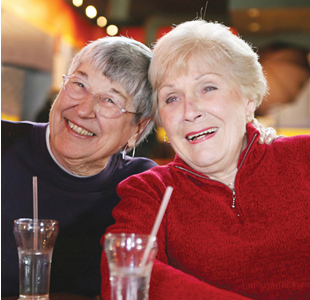
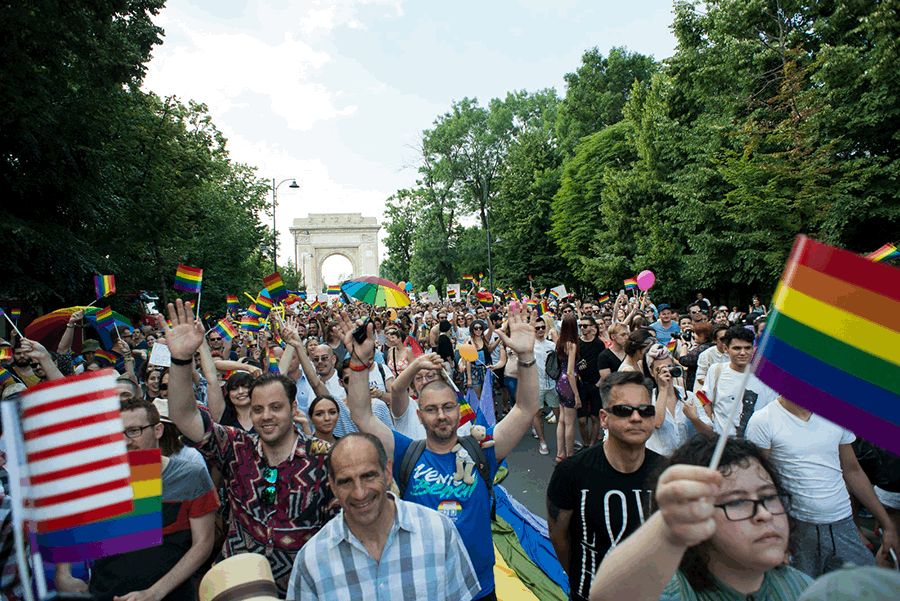
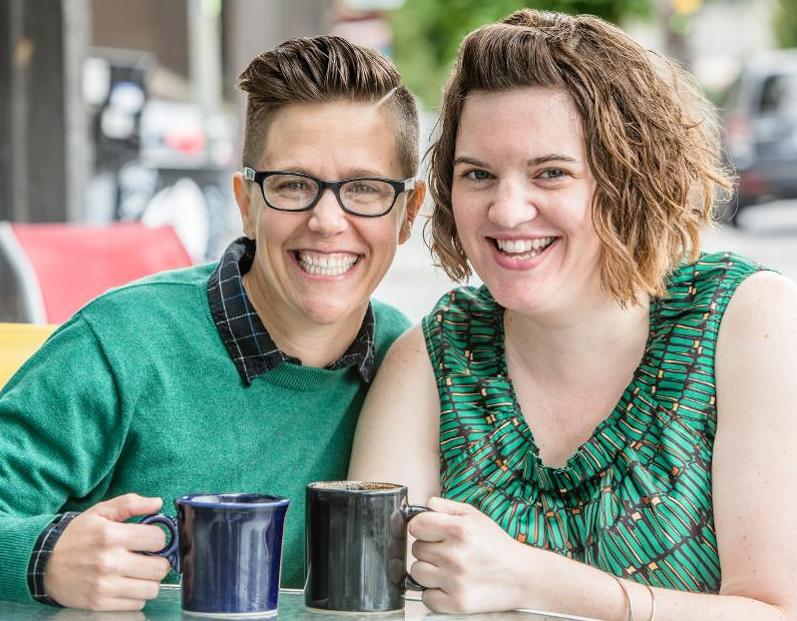
Historic Gayborhoods You Should Visit
That are Still Thriving
LGBTQ People are Marvels
Stars You Had No Idea Were Queer In Real
Life
Advocate Mag: Why Do You Have to Say
They're Gay?
Star-Studded GLAAD Media Awards in New York City
Wikipedia:
LGBTQ
Smoking Hot Gen Z Celebs Who Prove The Future Is Queer
Everyone is Gay
Gen Z: The Queerest Generation Yet
100 Gay Things To Do Before You Die
What is a Gayborhood?
Still Thriving: Historic Gayborhoods You
Should Visit in 2026
The Queer Agenda: Essays
by Shohreh Davoodi
Sophia's Story
Invisible
Histories Project
Four-in-ten
respondents to the Pew Research Center survey, in 2015,
identify themselves as bisexual. Gay men are 36% of the
sample, followed by lesbians (19%) and transgender
adults (5%). While these shares are consistent with
findings from other surveys of the LGBTQ population,
they should be treated with caution. There are many
challenges in estimating the size and composition of the
LGBTQ population, starting with the question of whether
to use a definition based solely on self-identification
(the approach taken in this report) or whether to also
include measures of sexual attraction and sexual
behavior.
Other recent survey-based research reports have made
estimates in the 3.5% to 5% range. However, all such
estimates depend to some degree on the willingness of
LGBTQ individuals to disclose their sexual orientation
and gender identity, and research suggests that not
everyone in this population is ready or willing to do
so.
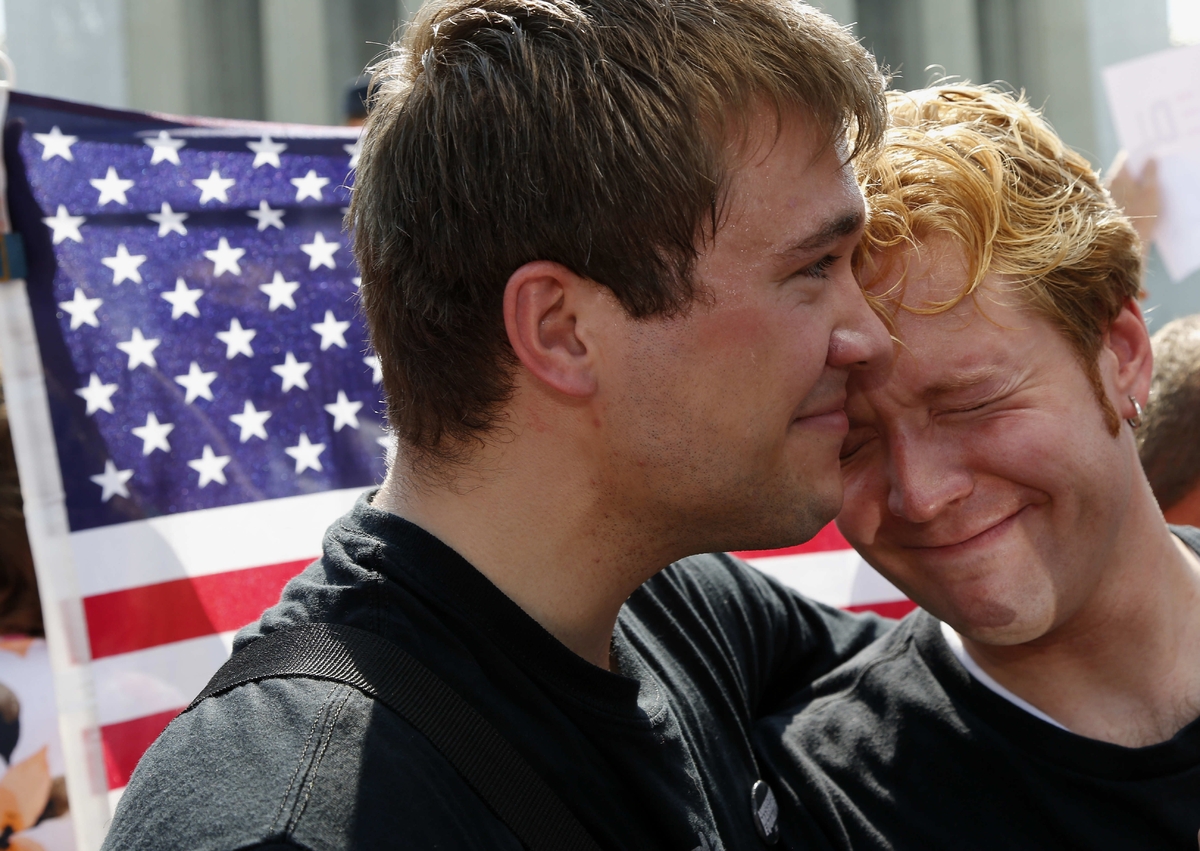
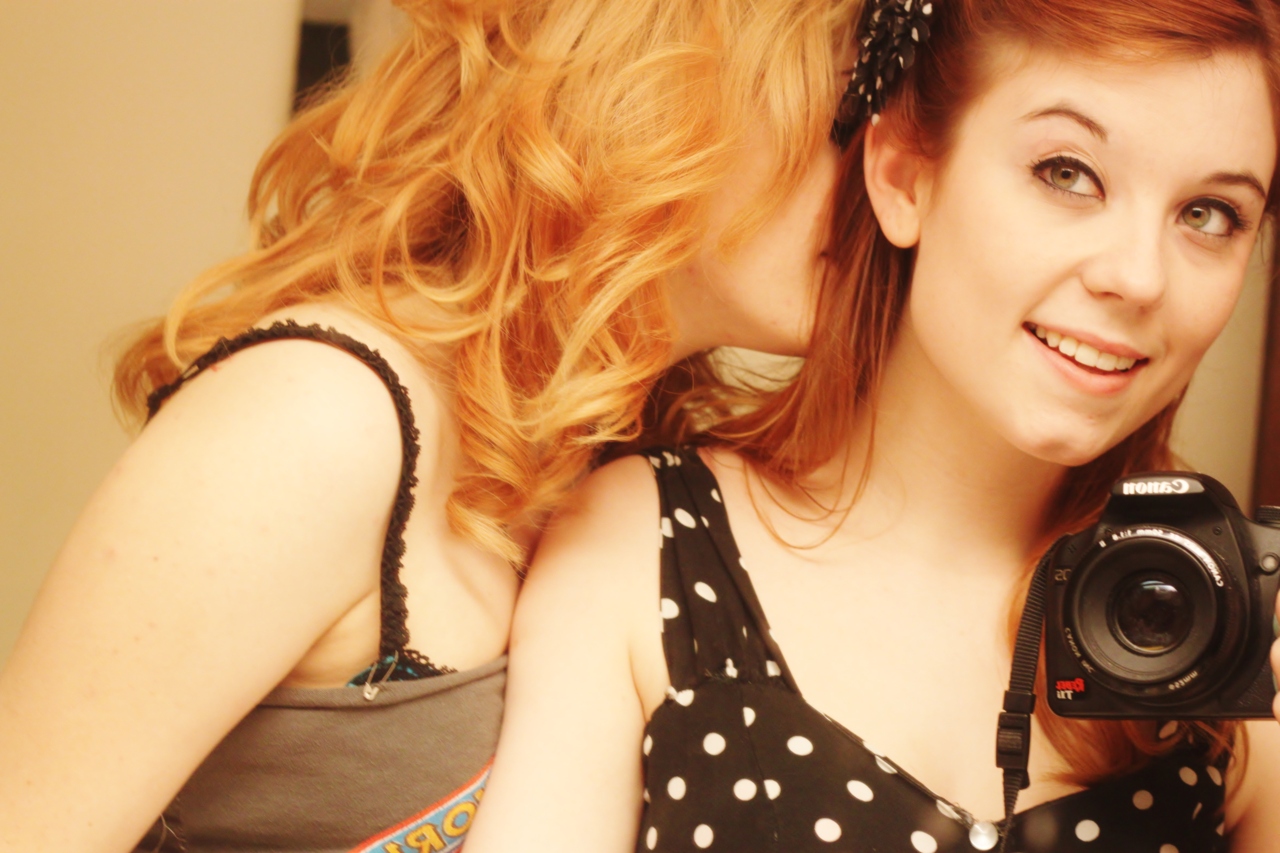
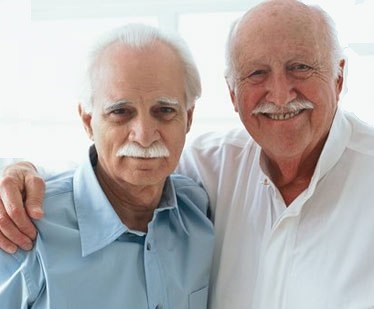
Miriam Margolyes Identifies as an
Unapologetically Woke Left-Wing Dyke
Out 100: 2023
List of LGBTQ Celebrities
Bowie's Story
LGBTQ Pride Started With Protest
How Well Do You Know Your Pride Flags?
LGBTQ People Have Been Around Forever,
Historians Say
New Research: Gay Men and Stress
GLAAD Annual Report: Accelerating Acceptance 2019
LGBTQ Voices: Learning
From Lived Experiences
Pew Research Center: LGBTQ Social and Demographic Trends
National Survey: State of
the LGBTQ Community in 2020
LGBTQ Voices: Learning
From Lived Experiences
LGBTQ Community
Gay, lesbian,
bisexual, transgender, and queer people have existed in
every time period in history, in every culture, in every
segment of society, in every walk of life. They are
represented in every race, religion, and political
affiliation. Apparently,
sexual orientation is not related to one’s social
standing, moral perspective, cultural setting,
ethnicity, or upbringing. And it does not seem to be
part of a trend or a phase someone is going through.
Although members of a sexual minority,
LGBTQ people are otherwise no different from anyone else. They have
regular jobs. They vote and pay taxes. They shop and buy
things. They attend school. They engage in recreation
and leisure activities. They have families. They raise
children. They attend their church, temple or mosque.
They care about political and social issues. They
contribute to the economy. They date. They fall in love.
They care about their relationships. They are your
classmates, co-workers, colleagues, neighbors, friends,
relatives. They are your mothers and fathers, brothers
and sisters, sons and daughters.
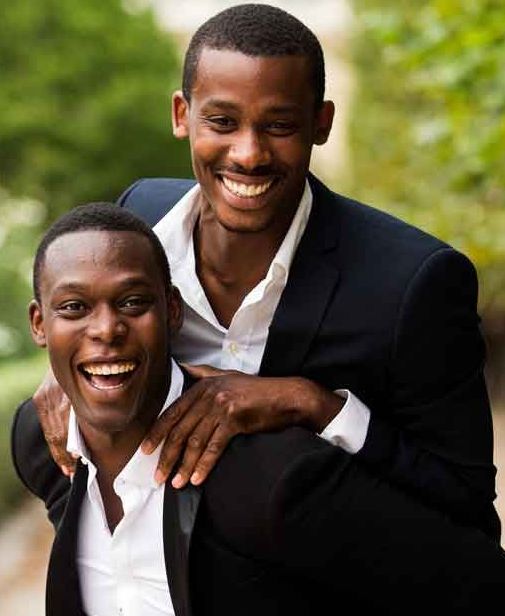
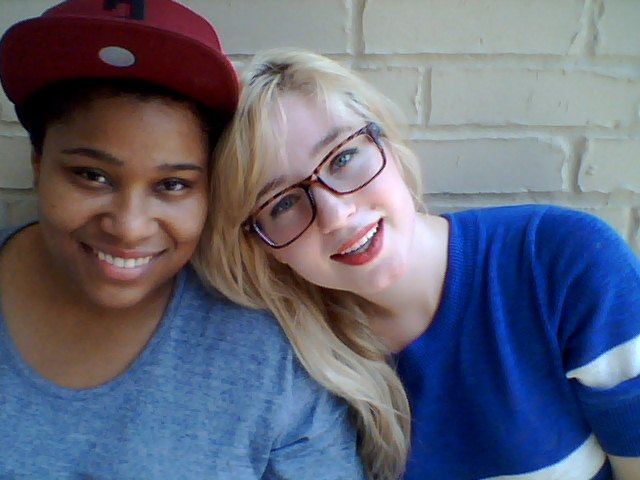
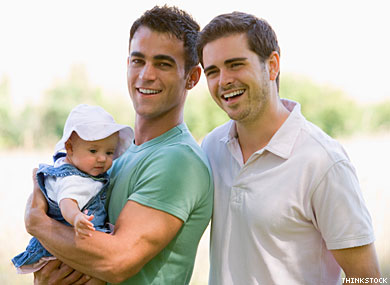
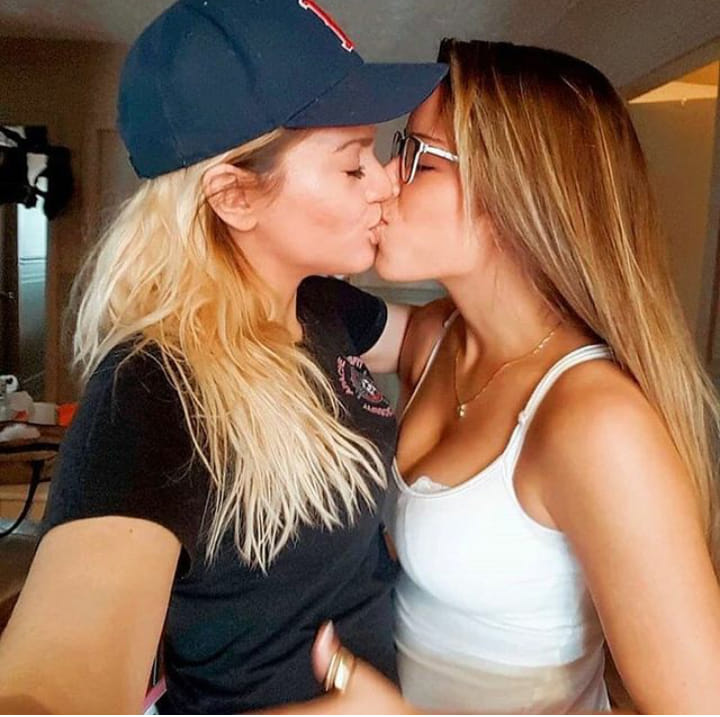
LGBTQ
people are active in their communities. They serve in
important leadership roles. They are teachers,
engineers, doctors, lawyers, musicians, and artists. They have
made, and continue to make, great contributions in all
areas of society, including literature, the arts,
entertainment, athletics, religion, education, business,
sales, finance, law, science, medicine, government, politics, and the
military.
Still Thriving: Historic Gayborhoods You
Should Visit in 2026
World’s Biggest Queer Culture Museum is in Australia
Advocate Mag: Why Do You Have to Say
They're Gay?
Star-Studded GLAAD Media Awards in New York City
2020 Out 100 List
LGBTQ Pride is More Than a Parade
Kinsey Institute: Who Are These LGBTQ Americans?
Ellen: Best of LGBTQ Pride
LGBTQ Celebrities Who Are Out and Proud
Smoking Hot Gen Z Celebs Who Prove The Future Is Queer
Advocate: Lessons From
Stonewall
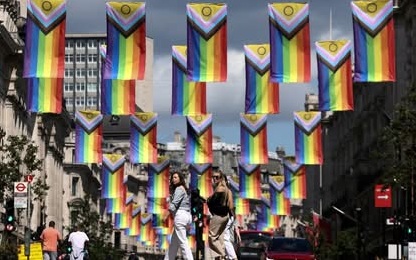
LGBTQ Storytelling:
Education Saves Lives
Celebrate,
commemorate, and most importantly educate...
Too often,
LGBTQ stories have been relegated to side notes in the
history books, ignoring the significant contributions
that the Queer community has made in all aspects of life
– to medicine, the law, the arts, commerce, politics,
and so much more. Without these stories being told,
prejudice and discrimination will remain against our
community.
So, the LGBTQ community must continue to tell its story.
We must celebrate, commemorate, and most importantly,
educate. Education saves lives. As we tell our stories,
raise awareness, and inform the public, we combat
bullying that arises from misunderstanding and to
overcome homophobia born from deep-rooted ignorance. It
serves as a reminder that all identities are valid,
equal and seen and that inclusivity must apply to every
single one of us.
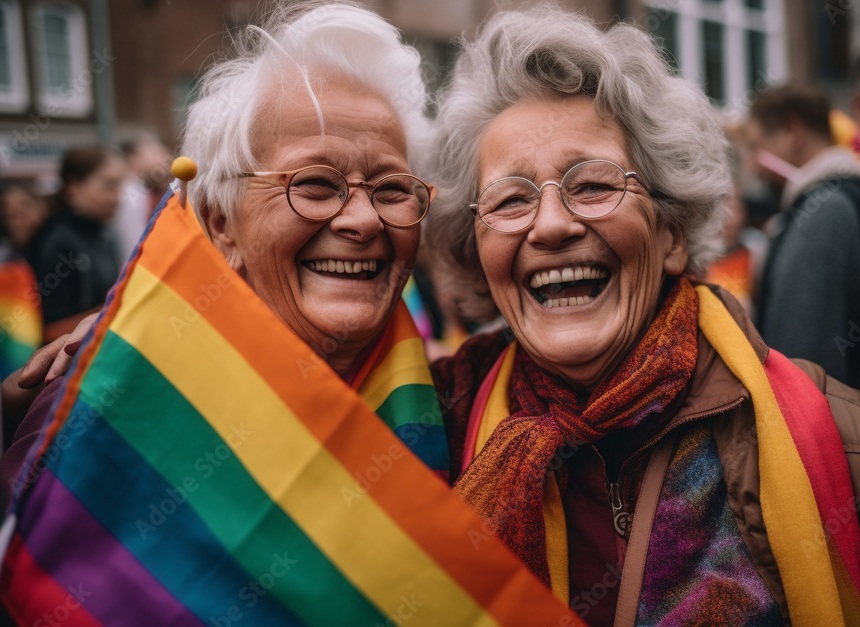
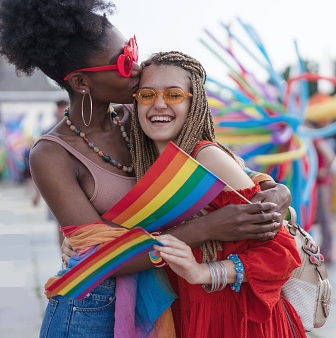
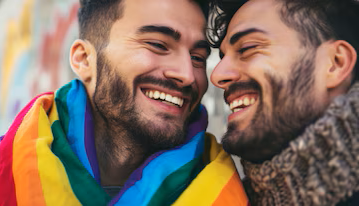
It is crucial as a community that we remember our
history, that we remember our challenges, our
accomplishments, and our successes. We must ensure that
LGBTQ stories are not only recorded, but are vibrantly
told and celebrated.
We must
prioritize education to ensure that not only is
society’s mindset and language more informed and
respectful, but also to encourage all people to stand
proudly as themselves, knowing that there is a community
behind them. For it is education that can deliver
tolerance over intolerance and respect over hate.
We ask others to consider with what it means to be
inclusive and respectful of everyone’s identity, and
with a sense of empathy to find ways to celebrate that
in all communities. Education, awareness, and
understanding are the best ways to replace prejudice and
fear with love and confidence.
LGBTQ People are Marvels
Gen Z: The Queerest Generation Yet
Video List: Famous LGBTQ Folk
Miriam Margolyes Identifies as an
Unapologetically Woke Left-Wing Dyke
LGBTQ Pride Started With a Riot: Remembering Stonewall
Rebekah's Story
Faces: Can You See Past the Label?
Politico: LGBTQ Community Stories
Queer Daze
Video: How Gay is
America?
Lilly Singh and Friends
Celebrate Pride Month
Queer Majority: Articles
and Issues
LGBTQ Pride Started With Protest
The Feisty
Collective Brings Queer Joy to the Heights in Houston
Loud-and-proud playground for queer artists and
makers
Kris Owens spotlights queer makers and builds joyful
community connections. Art as a means of joyful
resistance is a hallmark within the LGBTQ community.
Owens owns The Feisty Collective, a shop located in the
Heights that showcases queer artists and makers who
truly understand the power that art has. The shop sells
queer-centric crafts and goods while platforming a
mission of bringing people together in community and
solidarity. The Feisty Collective is a labor of love and
collaborative effort years in the making.
Owning a shop was familiar territory for Owens, who
co-owned a boutique years before. Still, the artist
admits that opening The Feisty Collective came with some
apprehension. “In March 2020, the pandemic hit and sank
us really fast. The store closure left Owens feeling
depressed, having always dreamed of owning their own
brick-and-mortar. “My customers came to me and said, ‘We
will come support you. Just believe in yourself.’ That
was my motivation to open this shop.”
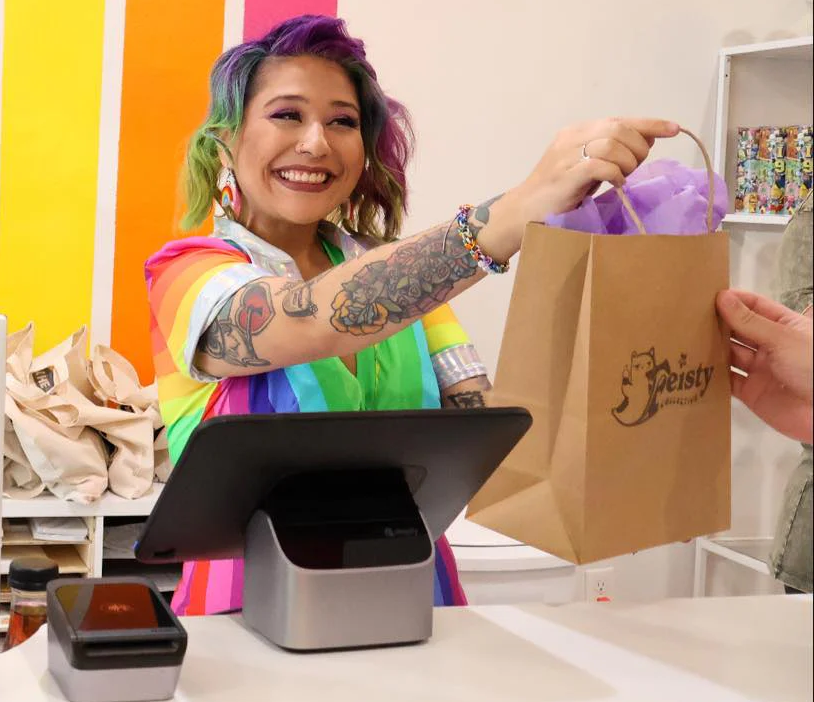
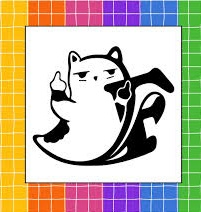
The Feisty Collective Brings Queer Joy to the Heights
The Feisty
Collective Website
The rainbow-painted exterior makes Feisty hard to miss.
The colorful outside is indicative of the queer joy
awaiting inside. Keychains hanging along the walls
amidst a variety of colorful stickers, T-shirts with
humorous catchphrases resting among enamel pins, candles
lined delicately alongside artist prints, and so much
more all fill the space. “I knew I didn’t want to just
feature my products. I had met so many amazing queer
artists and makers around town while I was selling at
markets over the past four years, and I knew this needed
to be a collective,” Owens says. “I wanted to be able to
showcase and spotlight them, as well.”
Owens has opened the door for makers outside of their
network, even drawing interest from overseas to sell in
their shop. “Primarily we feature local queer artists,
but we have some from as far as France,” they explain.
“Artists will reach out to us and say, ‘Hey, we love
what you’re doing and we would love to be a part of it.’
Every three to four months, we will rotate people out
and bring in new makers. That way everybody has an
opportunity to be in here, one way or another.”
The shop’s location was a no-brainer for Owens, whose
decision to open outside of Houston’s “gayborhood” was
intentional. “Queer people exist outside of Montrose. I
love Montrose, but we deserve to be seen everywhere,”
they say. “Everyone’s so friendly, and I think the
Heights is starting to become the new Montrose. There
are so many queer people in this neighborhood.”
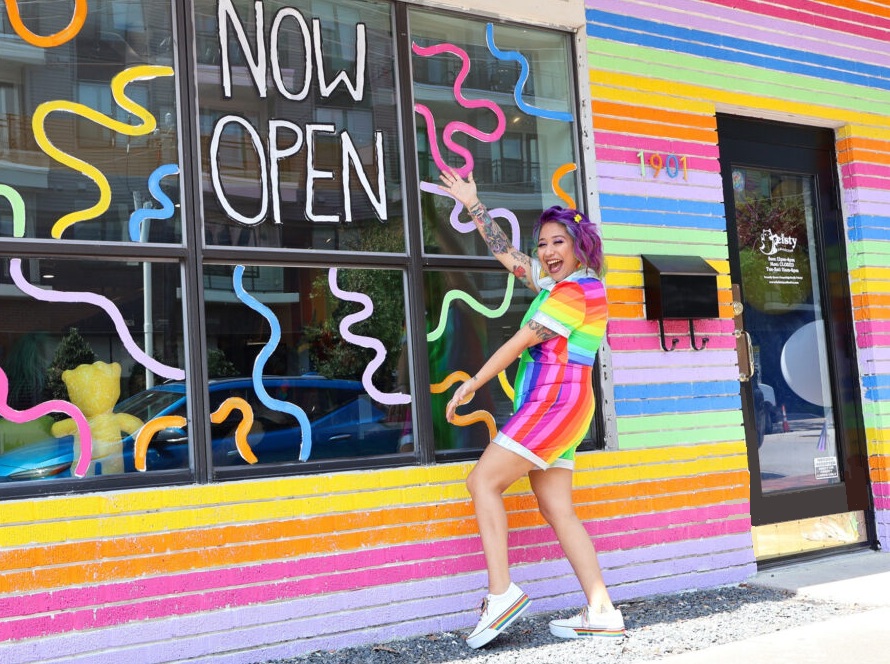
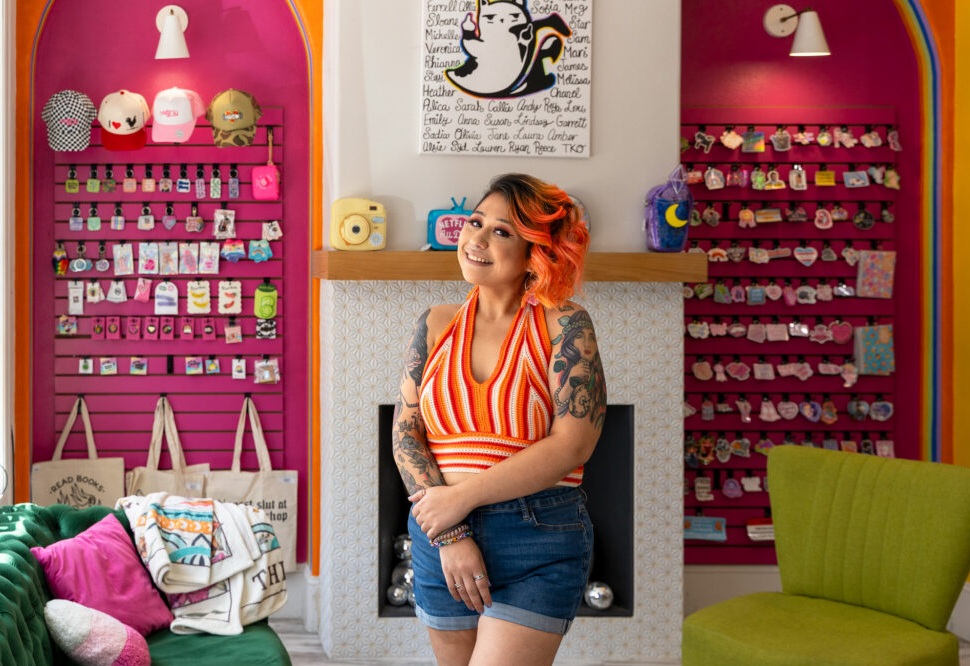
The Feisty Collective Brings Queer Joy to the Heights
The Feisty
Collective Website
In addition to selling unique queer creations, Owens
hosts a number of events throughout the year. “I love
connecting people and creating community,” they say.
Events include book clubs, group coloring nights, friend
speed dating, and more. “These events allow community
building to naturally happen with safe and like-minded
people. Queer events around town are largely focused in
bars, or there’s usually a drinking element involved. I
love a margarita, but I wanted a space where people
could go and still find community without the drinking
or club element, because it can be hard to make genuine
connections that way.
“A lot of the queer events are not family-friendly or
kid-friendly, so I wanted to host events for our younger
generation of queer kiddos,” the artist explains. Such
events include trivia nights, karaoke parties, drag
queen story hours, and drag shows that Owens often
performs in as LoteRina. “My drag community has really
supported me and the shop by doing free shows, helping
behind the register, and spreading the word.” Events are
primarily hosted by Owens, but vendors and people in the
community are also welcome to host events.
The shop’s success is representative of years of hard
work and perseverance. The fruits of Owens’s labor shine
as bright as the shop’s exterior rainbow wall, which
serves as a beacon of queer joy in the Heights. “I hope
when people visit they leave feeling stronger than when
they first walked in. Stronger in the sense of
community, who they are, and just knowing they’re not
alone. They always have a friend here,” Owens says.
“When the world and everything around us feels chaotic,
there’s a little slice of queer joy they can find here.
My hope is that customers feel loved, seen, heard, and
feisty!”
[Source: Zach McKenzie, OutSmart Magazine, July 2025]
Still Thriving: Historic Gayborhoods You
Should Visit in 2026
Stars You Had No Idea Were Queer In Real
Life
Advocate Mag: Why Do You Have to Say
They're Gay?
Star-Studded GLAAD Media Awards in New York City
Out 100: 2023
List of LGBTQ Celebrities
Wikipedia:
LGBTQ
Smoking Hot Gen Z Celebs Who Prove The Future Is Queer
Everyone is Gay
Gen Z: The Queerest Generation Yet
100 Gay Things To Do Before You Die
What is a Gayborhood?
Celebrities Who Came Out in 2021
The Queer Agenda: Essays
by Shohreh Davoodi
Sophia's Story
Invisible
Histories Project
LGBTQ Celebrities Who Came
Out in 2020
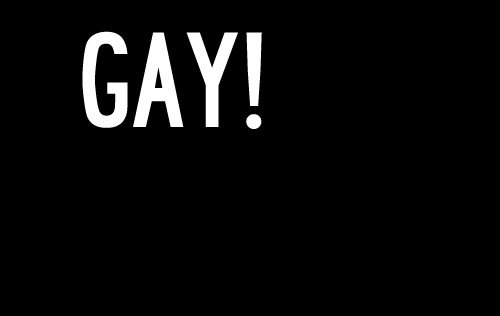
LGBTQ
Population in
the US
Which
State Is the Queerest? What States Have the Most LGBTQ
People?
The
Williams Institute at the University of California, Los
Angeles, has released a report on the adult LGBTQ
population of the United States, revealing some
unexpected information about the queer hubs of modern
America.
Overall, 14.1 million people in the US reported that
they "identify as LGBTQ" between 2020 and 2021, making
up a significant portion of the population at 5.6
percent. But not everyone is living in New York or
California — in fact, neither cracked the top ten of
states with the most LGBTQ people, relative to
population.
Going by population alone, California is the state with
the most LGBTQ people (1,549,600). That makes sense,
seeing as California has the largest overall population
of any state. However, California's LGBTQ people make up
a relatively small portion of the state's total
population (just 5.1 percent).
When looking at population by proportion, several states
surprised us with how large their LGBTQ demographic is.
Washington DC technically has the highest percentage of
LGBTQ people, with 81,400 making up 14.3 percent of the
capital's population (Our list only includes actual
"states").




Here are
the states with the most LGBTQ people,
percentage-wise....
10. Ohio - 557,600 LGBTQ residents / 6.2 percent of
population
9. Minnesota (Tie) - 267,600 LGBTQ residents
/ 6.3 percent of population
9. Tennessee (Tie) - 328,900 LGBTQ residents
/ 6.3 percent of population
8. Rhode Island (Tie) - 54,800 LGBTQ
residents / 6.5 percent of population
8. Maine (Tie) - 69,900 LGBTQ residents /
6.5 percent of population
8. Massachusetts (Tie) - 356,200 LGBTQ
residents / 6.5 percent of population
7. Nevada - 150,100 LGBTQ residents / 6.6
percent of population
6. Colorado - 294,500 LGBTQ residents / 6.8
percent of population
5. Washington - 398,700 LGBTQ residents /
6.9 percent of population
4. New Hampshire - 78,400 LGBTQ residents /
7.2 percent of population
3. Vermont - 37,600 LGBTQ residents / 7.4
percent of population
2. Delaware - 56,600 LGBTQ residents / 7.5
percent of population
1. Oregon - 253,300 LGBTQ residents / 7.8
percent of population
[Source: Ryan Adamczeski, Advocate, Dec 2023]
LGBTQ People are Marvels
Demographics: How Gay is America?
Miriam Margolyes Identifies as an
Unapologetically Woke Left-Wing Dyke
World’s Biggest Queer Culture Museum is in Australia
HuffPost: LGBTQ Elders Share Their Thoughts About
Today's Queer Youth
Queer View
Mirror
Info: Famous LGBTQ People
Star-Studded GLAAD Media Awards in New York City
Video: How You See Me
Our Trans Daughter: Jamie and Rebekah
Info: History of the LGBTQ Movement
Queer Quizzes
Advocate: How to Be More
Out and Proud in Your Everyday Life
Ellen: Best of LGBTQ Pride
78-Year-Old Man and 13-Year-Old Boy Talk About Being Gay
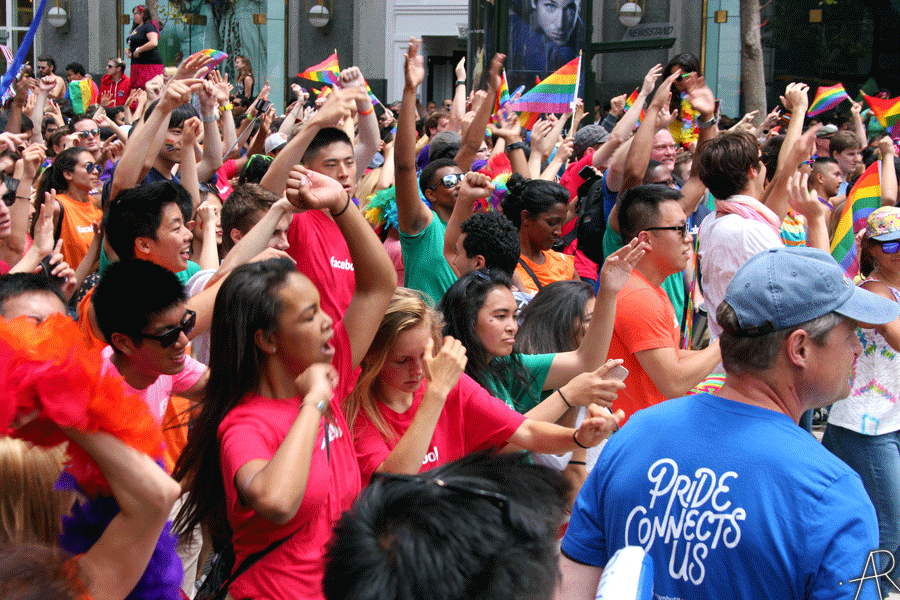
Contributions
and Affirmations
"I belong
to a culture that includes Proust, Henry James,
Tchaikovsky, Cole Porter, Plato, Socrates, Aristotle,
Alexander the Great, Michelangelo, Leonardo da Vinci,
Christopher Marlowe, Walt Whitman, Herman Melville,
Tennessee Williams, Bryon, EM Forster, Lorca, Auden,
Francis Bacon, James Baldwin, Harry Stack Sullivan, John
Maynard Keynes, Dag Hammarsskjold. These are not
invisible men."
-Larry
Kramer
What
wonderful and amazing things would be missing from our
world without the contributions of the LGBTQ community?
We would not have the great literary works of Oscar
Wilde, James Baldwin, Herman Melville (Moby Dick), Walt
Whitman (Leaves of Grass), Alice Walker (Color Purple),
Tennessee Williams (Streetcar Named Desire), Truman Capote, and
Gertrude Stein.
There would be no modern day computers without
mathematician Alan Turing. The space program would not
have Sally Ride. The field of neurological
research would not have Oliver Sacks. Coronoavirus
research who not have had a champion in Rachel Levine.
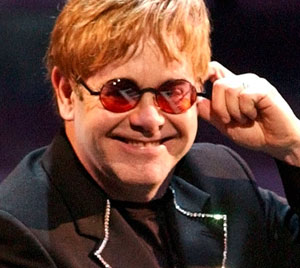
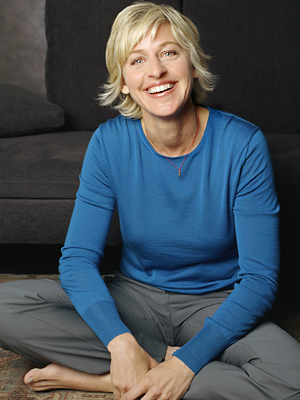
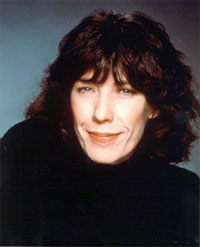
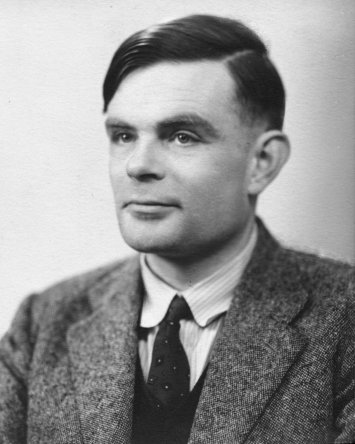

Stars You Had No Idea Were Queer In
Real Life
Advocate Mag: Why Do You Have to Say
They're Gay?
Out 100:
2023 List of LGBTQ Celebrities
What Does It Really Mean to Be Queer?
Brandi Carlile Receives HRC Visibility
Award
Video: LGBTQ Facts to Celebrate
Story Corps: LGBTQ Stories
World’s Biggest Queer Culture Museum is in Australia
Kinsey Institute: Who Are These LGBTQ Americans?
Dame Edna Interviews KD Lang
List: Famous LGBTQ People
How Well Do You Know Your Pride Flags?
Gen Z: The Queerest Generation Yet
Dame Edna and KD Lang
Wikipedia: LGBTQ Community
LGBTQ Celebrities Who Are Out and Proud
There
would be no America the Beautiful without
Katherine Lee Bates. We would not have the great musical
compositions of Stephen Sondheim,
Aaron Copland, and Cole Porter. There would be no
West Side Story without Leonard Bernstein.
There would be no Take the A Train without Billy
Strayhorn. There would be no Nutcracker Suite
without Tchaikovsky. There would be no
Brahms, Schubert, Stravinsky, Chopin, or
Handel.
We would not have the Mona Lisa or The Last
Supper without Leonardo DiVinci. We would not have
Grant Wood's iconic American Gothic.
The fashion world would not have Giorgio Armani, Pierre
Cardin, Christian Dior, Perry Ellis, or Yves Saint
Laurent.
The world of
children's literature would be without
Hans Christian Andersen (Little
Mermaid, Ugly Duckling, Emperor's New Clothes, Snow
Queen) and Maurice Sendak (Where the Wild Things
Are). No Andy Warhol in the
world of art. No Rudolf Nuryev, Josephine
Baker, or Isadora Duncan in the world of dance.
The pop music world would not have icons
like Elton
John, Freddie Mercury, David Bowie, Michael Stipe,
Brandi Carlile, Melissa Etheridge, Boy George, Chely
Wright, Ricky
Martin, Barry Manilow, or KD Lang. Bands like the
Green Day, B-52, Culture Club, and Indigo Girls would
not exist. There would be no Mary Lambert, Harry Styles,
Brendan Urie, Jason Mraz, Kim Petras, Sam Smith, Hayley
Kiyoko, or Troye Sivan.
And can
you imagine a world without classic songs like
Goodbye Yellowbrick Road or Bohemian Rhapsody?
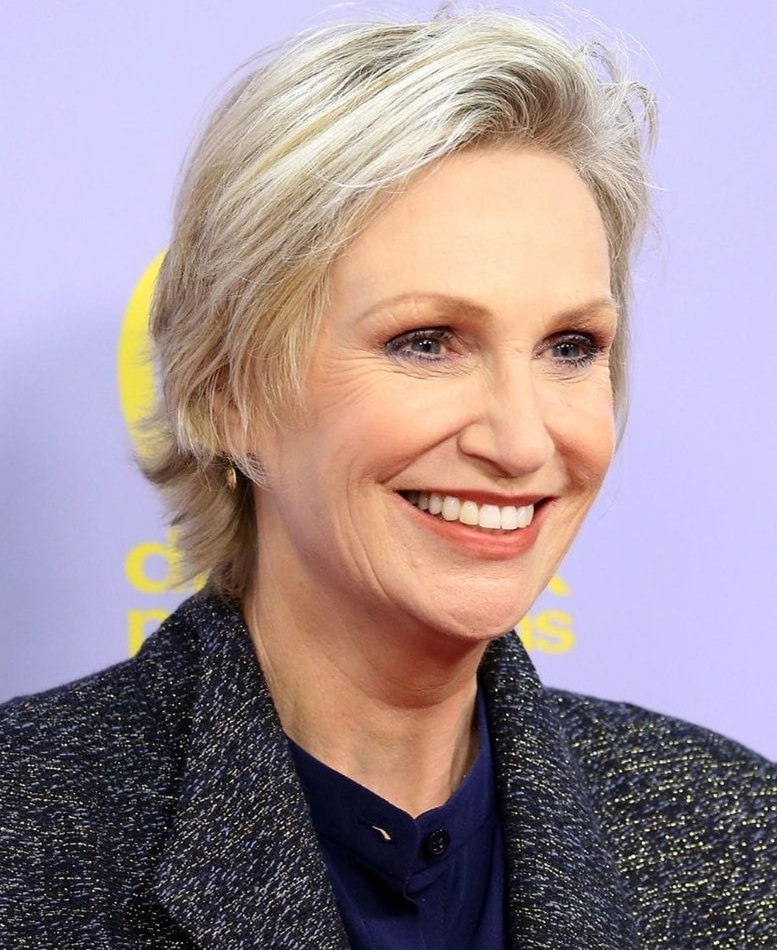
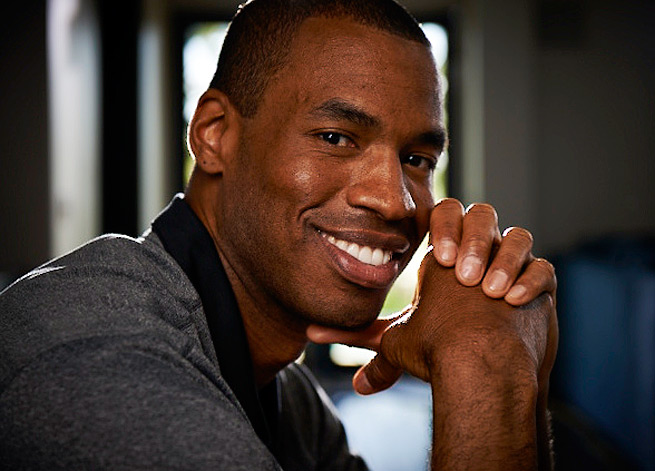
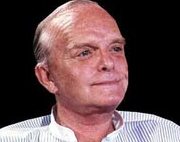
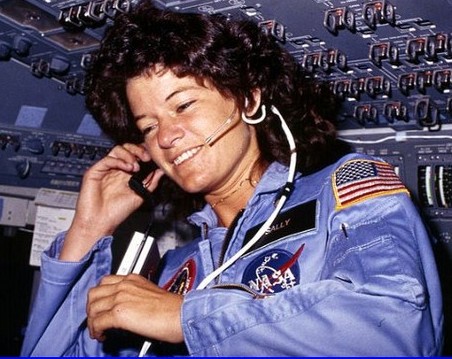
Still Thriving: Historic Gayborhoods You
Should Visit in 2026
Star-Studded GLAAD Media Awards in New York City
LGBTQ: Acronyms and Words
Words Words
Video:
We Get It, You’re Gay
Smoking Hot Gen Z Celebs Who Prove The Future Is Queer
Shear's Story
I Support the LGBTQ Community
Man Paints House Rainbow Colors as Revenge to Anti-Gay
Neighbor
Jessica: Are Labels
Important?
78-Year-Old Man and 13-Year-Old Boy Talk About Being Gay
Lilly Singh Celebrates
Pride Month
LGBTQ Pioneers Everyone Should Know
Info: Famous LGBTQ People
Bowie's Story
Mojo: Most Inspirational
LGBTQ Celebrities
Pew Research Center: LGBTQ Social and Demographic Trends
Television news media would not have
Rachel Maddow, Anderson Cooper, Suze Orman, Don Lemon,
Sam Champion, Robin Roberts, or Shepard Smith.
The entertainment world
would have no Rock Hudson, Ellen Degeneres, Lily Tomlin,
BD Wong, Jodie Foster, David Hyde Pierce, Portia DeRossi,
Richard Chamberlain,
George Takei, Sean Hayes, Neil Patrick Harris, Wanda
Sykes, Meredith Baxter, Kelly McGillis, Jim Parsons,
Jesse Tyler Ferguson, Gillian Anderson, Jim Nabors,
Raven Symone, Laverne Cox, Kristen Stewart, Jane Lynch,
or Kate McKinnon.
Without
the film production couple of Merchant and Ivory, we
would not have the Academy Award winning films,
Howard's End, Room With a View, Remains of the Day,
and Call Me By Your Name.
The sports world would not have Megan
Rapinoe, Martina
Navratilova, Greg Louganis, Billie Jean King, Jason
Collins, Michael Sam, Brian Boitano, Orlando Cruz, or
Caitlyn Jenner.
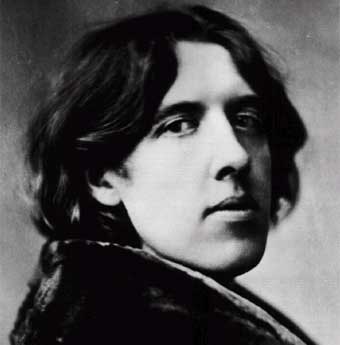
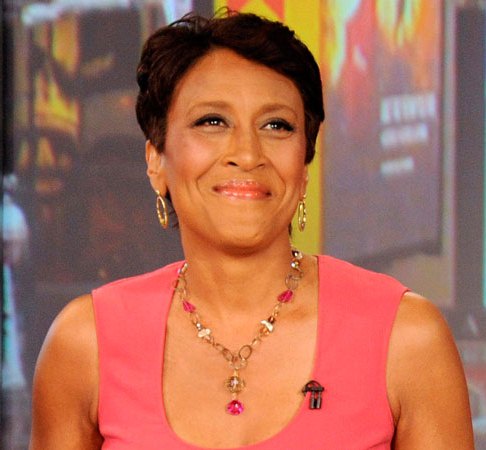
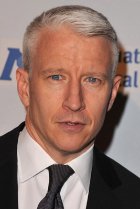
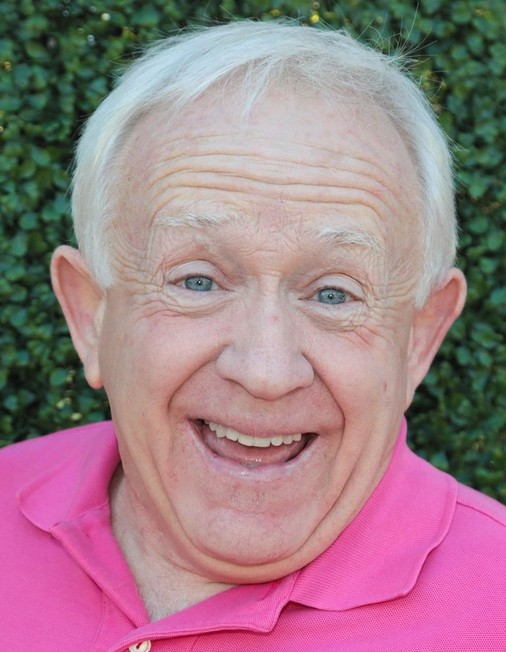
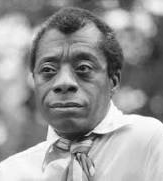
Famous LGBTQ People
History of the LGBTQ Movement
LGBTQ Celebrity Couples
Famous LGBTQ People in Science and Technology
LGBTQ
Heroes and Champions
LGBTQ Arts, Culture, and
Entertainment
Famous LGBTQ People in Sports and Athletics
LGBTQ Leisure and Recreation
Famous LGBTQ Politicians
LGBTQ Marketplace
Research and Data on the LGBTQ
Community
LGBTQ Movie Stars
LGBTQ Television Stars
Welcome to the
Gayborhood
LGBTQ Safe Spaces and Cultural Enclaves...
A "gayborhood"
is a city, district, or geographic area known for having
a high concentration of LGBTQ residents, businesses, and
establishments. These neighborhoods often serve as safe
spaces and centers of community for LGBTQ individuals,
providing a sense of belonging and acceptance. Here are
the key characteristics of a gayborhood...
--High
concentration of LGBTQ residents - Gayborhoods are
characterized by a significant presence of LGBTQ
individuals, both residents and visitors.
--LGBTQ oriented businesses - They typically feature a
variety of bars, restaurants, clubs, shops, and other
businesses that cater to the LGBTQ community.
--Safe spaces - Gayborhoods provide a sense of safety
and community for LGBTQ individuals who may face
discrimination or marginalization in other parts of
their city.
--Cultural enclaves - They often become cultural hubs
where LGBTQ individuals can socialize, connect, and
participate in community events.
--Historical significance - Many gayborhoods have a rich
history, having emerged as safe spaces for LGBTQ
individuals during periods of greater social
discrimination.
--Legal
rights - Gayborhoods emerged as a response to the social
and legal challenges faced by LGBTQ individuals,
providing a space where they could find community and
acceptance. They played a crucial role in the fight for
LGBTQ rights and recognition.
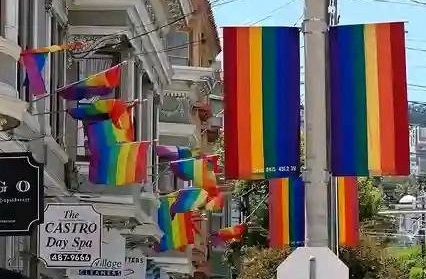

Modern
Gayborhoods - While many gayborhoods have evolved over
time, they continue to be important spaces for LGBTQ
individuals, providing community, culture, and a sense
of belonging. They may also be evolving as online spaces
and digital communities become more prominent. Here are
examples of some iconic gayborhoods:
--The Castro, San Francisco (California, USA)
--Boystown, Chicago (Illinois, USA)
--West Village, New York City (New York, USA), Home to
the Stonewall Inn
--Le
Marais, Paris (France)
--The
Gayborhood, Philadelphia (Pennsylvania, USA)
--Midtown,
Atlanta (Georgia, USA)
--Soho, London (England)
--Zona
Rosa, Mexico City (Mexico)
--West Hollywood, Los Angeles (California, USA)
--Chueca, Madrid (Spain)
--Montrose, Houston (Texas, USA)
--Nollendorfplatz,
Berlin (Germany)
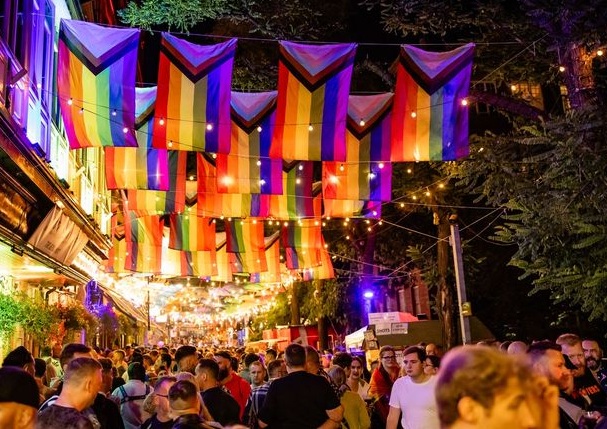
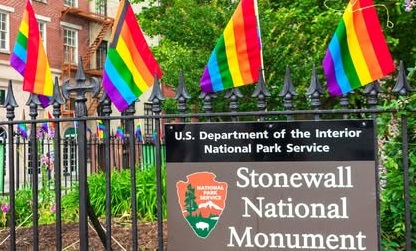
What is a Gayborhood?
Wikipedia: LGBTQ Culture
LGBTQ People are Marvels
Advocate: How to Be More
Out and Proud in Your Everyday Life
Sophia's Story
HRC: 2020 Pride Benefit
Concert
Celebrating LGBTQ
Trailblazers
Miriam Margolyes Identifies as an
Unapologetically Woke Left-Wing Dyke
Queer Majority: Essays, Articles, Issues
Wikipedia: LGBTQ Culture
Indya Moore: Daily Affirmations
What is Morally Wrong With Homosexuality?
National Survey: State of
the LGBTQ Community in 2020
LGBTQ Community:
Special and Important
The LGBTQ
community holds a profound significance in our society,
woven into the fabric of humanity with a richness that
enriches our understanding of diversity, acceptance, and
love. Their significance transcends mere demographics;
it lies in their resilience, their fight for equality,
and their unwavering commitment to authenticity.
First and foremost, the LGBTQ community embodies the
essence of diversity. They represent a vast spectrum of
identities, experiences, and expressions that challenge
traditional norms and expand our understanding of human
possibility. This diversity is not only a testament to
the complexity of human nature but also a celebration of
the multitude of ways in which individuals can live and
love.
Furthermore, the LGBTQ community serves as a beacon of
hope for marginalized groups everywhere. Through their
tireless activism and advocacy, they have paved the way
for progress in civil rights, healthcare, and social
acceptance. Their courage in the face of discrimination
and prejudice inspires others to stand up for justice
and equality, fostering a more inclusive and
compassionate society for all.
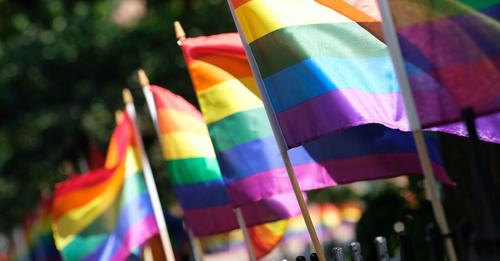
Stars You Had No Idea Were Queer In Real
Life
Advocate Mag: Why Do You Have to Say
They're Gay?
Queer Majority: Essays, Articles, Issues
LGBTQ People Have Been Around Forever,
Historians Say
Queer Voices Podcasts
Brandi Carlile Receives HRC Visibility
Award
LGBTQ Writers, Artists and
Activists of the 80s and 90s
Wikipedia:
LGBTQ
Invisible
Histories Project
World’s Biggest Queer Culture Museum is in Australia
I Support the LGBTQ Community
Man Paints House Rainbow Colors as Revenge to Anti-Gay
Neighbor
The Queer Agenda: Essays
by Shohreh Davoodi
Moreover, the LGBTQ community fosters a sense of
belonging and solidarity among its members. In a world
that often seeks to categorize and exclude, LGBTQ spaces
provide sanctuary and support for individuals to embrace
their true selves without fear of judgment or rejection.
These communities offer a sense of belonging that is
essential for mental health and well-being, reminding us
all of the importance of acceptance and understanding.



Additionally, the LGBTQ community challenges us to
rethink traditional notions of gender and sexuality,
encouraging us to question societal norms and embrace
the complexity of human desire and identity. By
challenging the status quo, they invite us to envision a
world where love knows no boundaries and where every
individual is free to express themselves authentically.
And, the LGBTQ community is special and important
because they embody the values of diversity, resilience,
and authenticity. Their presence enriches our society in
countless ways, reminding us of the beauty that lies in
our differences and the strength that comes from
embracing our true selves. As we continue to strive for
a more just and inclusive world, let us honor and
celebrate the LGBTQ community for the indelible mark
they have left on our hearts and our collective
consciousness.
Star-Studded GLAAD Media Awards in New York City
What is a Gayborhood?
I Support the LGBTQ Community
LGBTQ Celebrities Who Are Out and Proud
Man Paints House Rainbow Colors as Revenge to Anti-Gay
Neighbor
The Legacy Project
CBS News: 1 in 6 Gen Z Adults Identify as Queer
JoJo Siwa Tells Demi Lovato They Contributed to Her Gay
Awakening
Celebrating LGBTQ
Trailblazers
LGBTQ Activists You Should Know
PBS: LGBTQ America by the Numbers
Info:
Celebrating LGBTQ Pride
Sporcle: LGBTQ Trivia Quizzes and Games
PBS: LGBTQ America by the Numbers
DotGay Dictionary: Who Are Your LGBTQ
Role Models?
Pride
Primer
GLAAD Report:
More Americans Understand LGBTQ People
More and more people are identifying as members of the
LGBTQ community. Increased visibility educates non-LGBTQ
people, but it also comes with a purported price,
according to GLAAD's annual Accelerating Acceptance
Study that came out in Nov 2021.
The report found that 43% of non-LGBTQ people think
gender is not exclusively male and female, up from 38%
in 2020. And 81% of non-LGBTQ people anticipate
nonbinary and transgender people will become as familiar
in everyday life as gay and lesbian people have.
"Our community continues to grow, and we're seeing some
growing acceptance of that," says Sarah Kate Ellis,
GLAAD CEO. "We are seeing that the concept of gender, in
terms of non-LGBTQ Americans, is evolving." A poll
earlier this year found that 5.6% of adults in the US
identify as LGBTQ – a record.
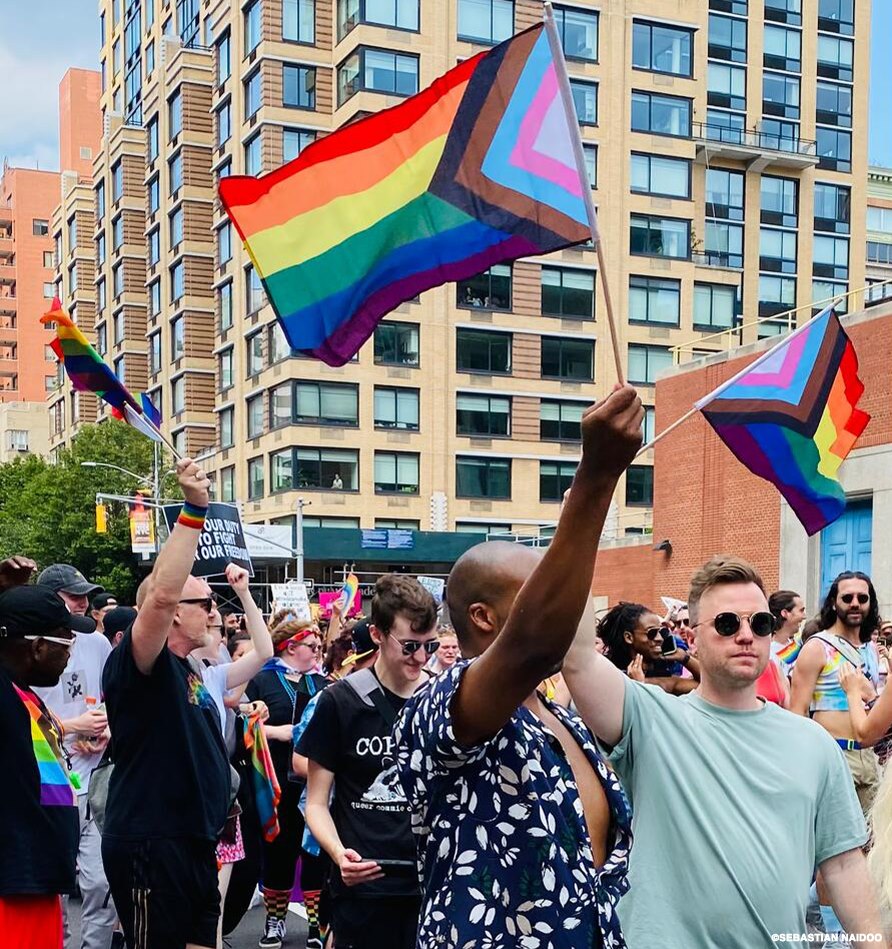
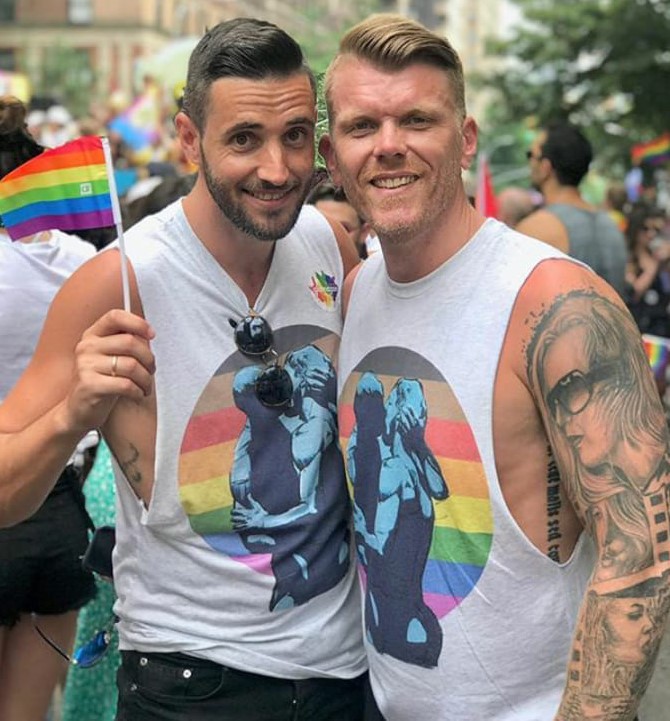
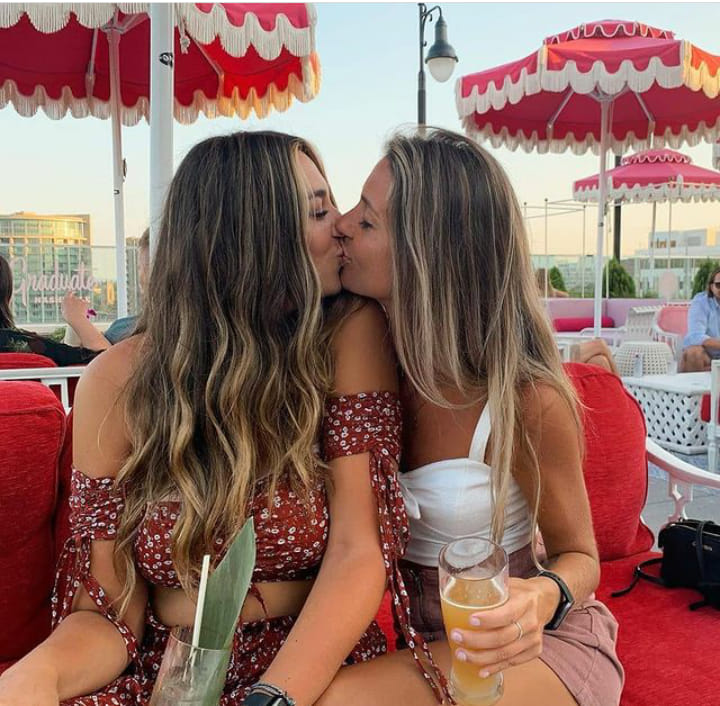
Out 100: 2023
List of LGBTQ Celebrities
Video: Introduction to the LGBTQ Community
Queer Quizzes
Advocate: Queer People Have Always Existed
Info: LGBTQ Biographies
Love Bravely: Mini LGBTQ Documentary
LGBTQ Alphabet
Famous LGBTQ People Everywhere
Rebekah's Story
78-Year-Old Man and 13-Year-Old Boy Talk About Being Gay
LGBTQ Pride Started With Protest
Census Estimate: One Million LGBTQ Households in America
How Well Do You Know Your Pride Flags?
Invisible
Histories Project
But people are not all the way there. Among non-LGBTQ
people, 45% admit they are confused by all the different
terms to describe people in the LGBTQ community. Ellis
says this requires education – the purpose of GLAAD's
work. "We know when people meet us and connect, or even
meet us through a television or now a phone screen, it
builds understanding which builds acceptance," Ellis
says.
GLAAD's research also found that six in 10 people said
they faced discrimination based on their sexual
orientation and gender identity – an increase of 13%
from last year. "That does bring up sort of the
double-edged sword of visibility," Ellis says. "As our
community continues to grow and become more visible,
we're seeing greater acceptance in some areas, and then
we are seeing these growing challenges for acceptance in
others, which are then turning into discrimination and
hate."
Ellis says this comes on the heels of four years of the
anti-LGBTQ Trump administration and current mounting
anti-trans legislation. Such hostility plays out in real
life. "Anti-trans legislation are solutions to problems
that don't exist," Ellis says. "There's no problems to
solve that we need to be legislating against in the
first place."
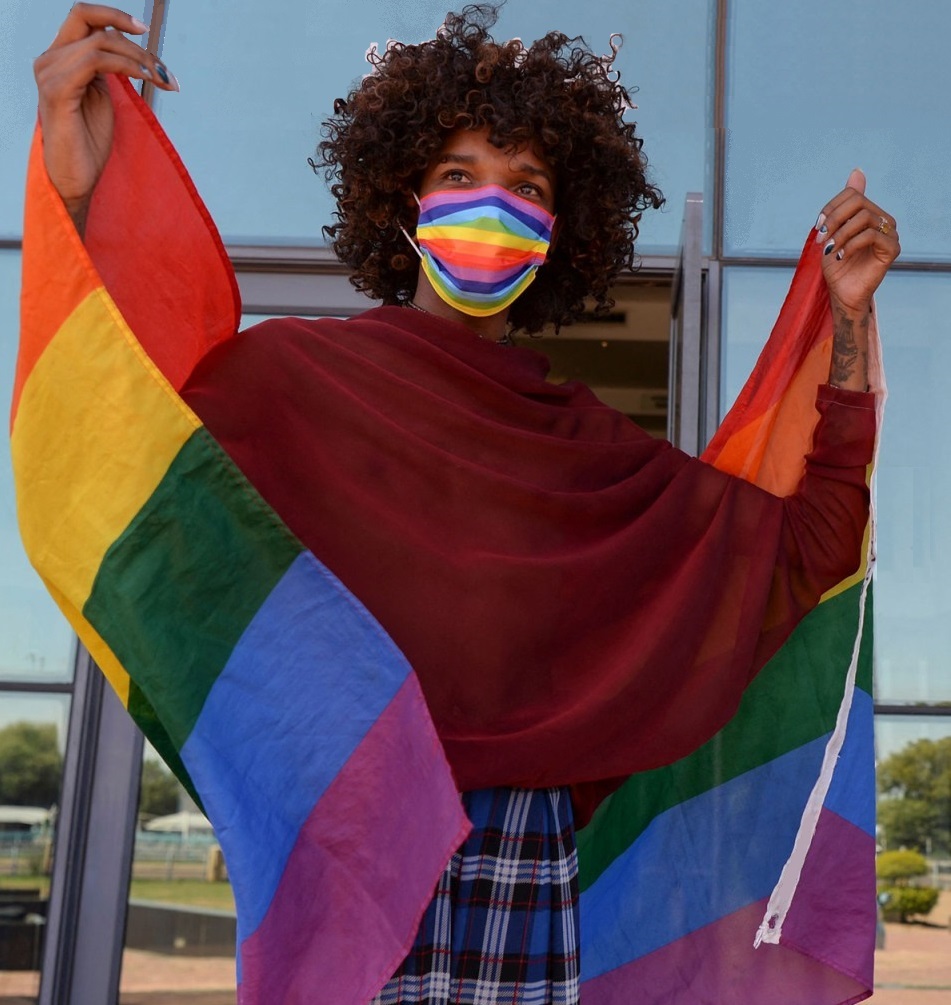 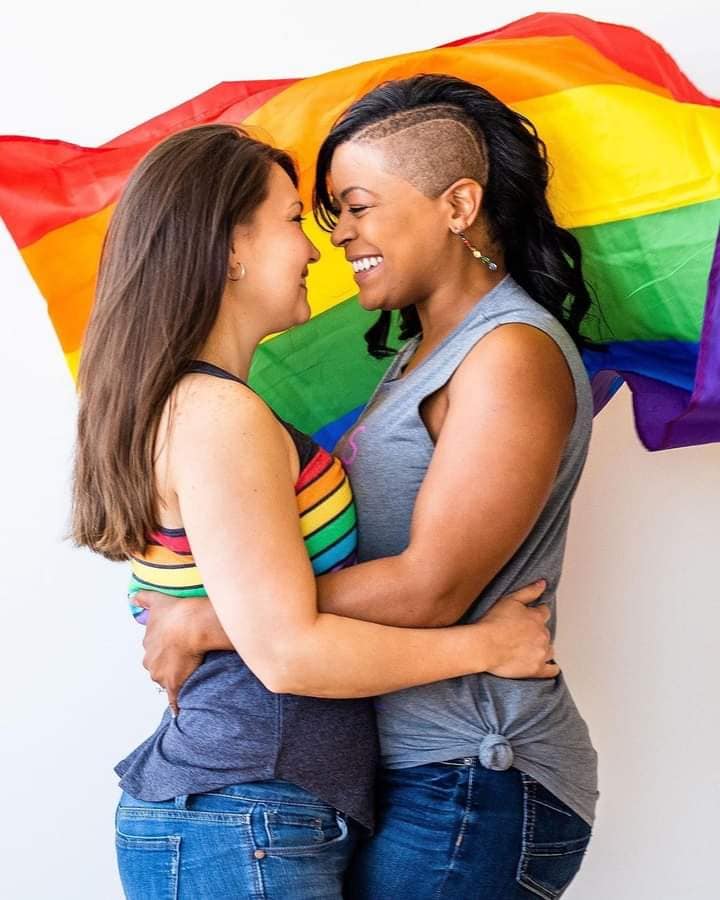
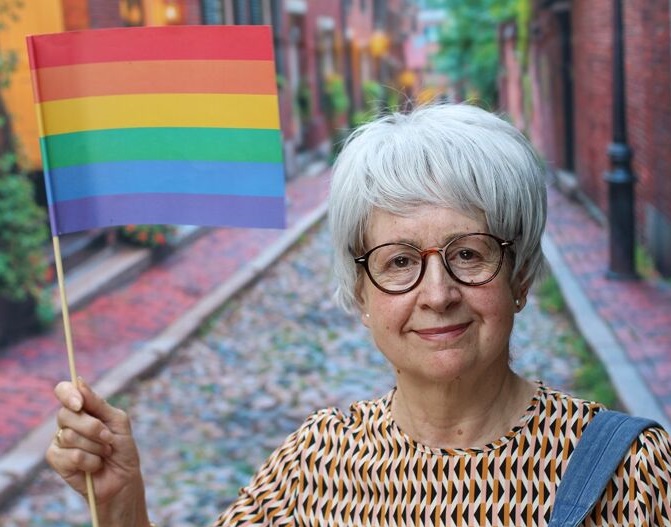
Advocate Mag: Why Do You Have to Say
They're Gay?
Star-Studded GLAAD Media Awards in New York City
Video List: Famous LGBTQ Folk
Miriam Margolyes Identifies as an
Unapologetically Woke Left-Wing Dyke
Wikipedia: LGBTQ Community
I Support the LGBTQ Community
Man Paints House Rainbow Colors as Revenge to Anti-Gay
Neighbor
GLAAD Report: More Americans Understand LGBTQ People
LGBTQ Milestones We’re Thankful For This Year
Brandi Carlile Receives HRC Visibility
Award
Sophia's Story
DotGay Dictionary: Who Are Your LGBTQ
Role Models?
Celebrities Who Came Out in 2021
What Does It Really Mean to Be Queer?
Smoking Hot Gen Z Celebs Who Prove The Future Is Queer
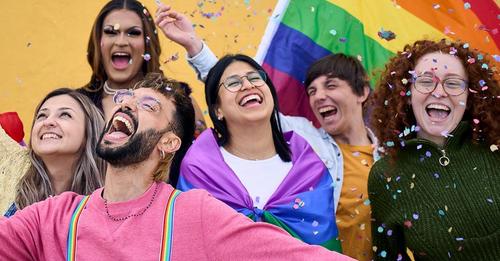
And who's facing the consequences most harshly? Kids.
"It's creating confusion for so many people, which
creates an unaccepting environment, hands down, and puts
targets squarely on the backs of most of our youth in
our community, (especially) our trans youth," Ellis
says.
GLAAD ran the Accelerating Acceptance study online in
January 2021 and included a national sample of 2,517 US
adults.
A lack of acceptance of the transgender community was on
full display Dave Chappelle's transphobic Netflix
special. It attempted to juxtapose the pace of civil
rights gained by LGBTQ people over those fought for by
the Black community. Chappelle repeatedly focused on
jokes that targeted the trans community, doubling down
on criticism that his sets punch down on the most
vulnerable.
"What the Chappelle and Netflix response shows is that
we are still up against an entertainment industry that's
not equal for LGBTQ people of color, especially trans
people of color," Ellis says. For GLAAD's part, "we are
treating this as a moment of transformation and an
opportunity to work with this community, specifically,
the comedian community," she says.
LGBTQ People are Marvels
Stars Who Came Out In 2023
Which US State Is The Queerest
HRC: LGBTQ Pride is More Than a Parade
World’s Biggest Queer Culture Museum is in Australia
Proposal
to Create National LGBTQ History and Culture Museum
More Than 20 Million Americans Identify as LGBTQ
GLAAD Report: More Americans Understand LGBTQ People
LGBTQ Milestones We’re Thankful For This Year
National Survey: State of
the LGBTQ Community in 2020
Pew Research Center: Global Divide on Homosexuality
Government Report: LGBTQ Youth Information
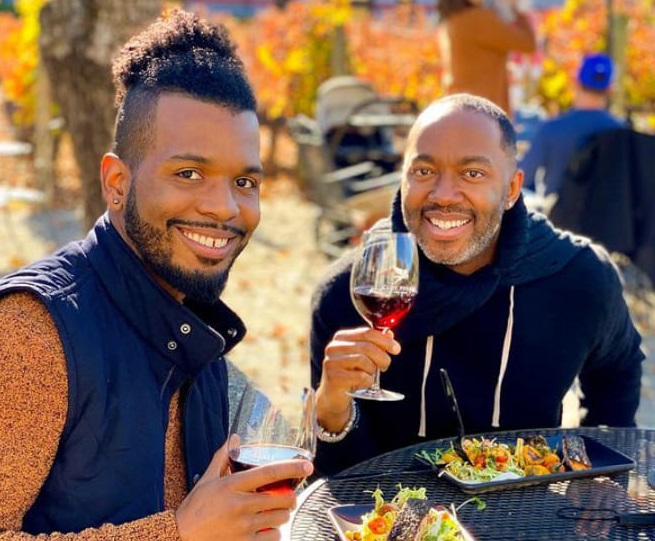
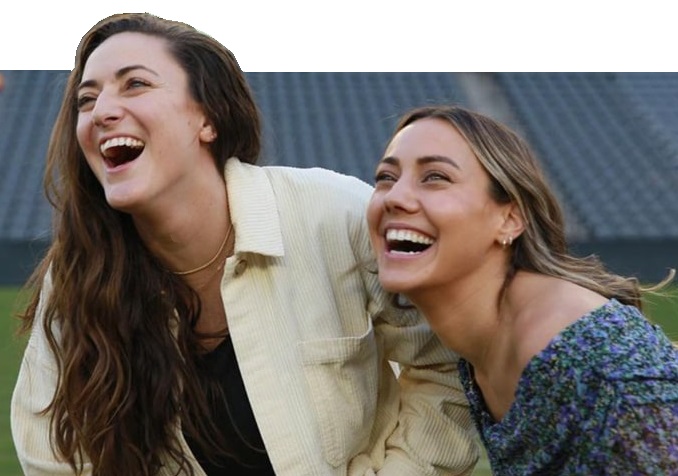
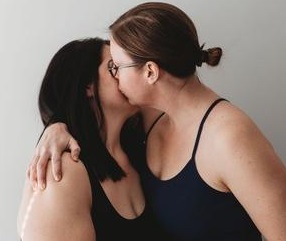
Celebrities, of course, can make a huge difference for
LGBTQ young people. More than 80% of LGBTQ youth said
celebrities who are LGBTQ positively impact how they
feel about their queer identities, according to research
from The Trevor Project. More and more celebrities have
embraced their gender identities recently, too: Just
look at Sam Smith, Elliot Page, Demi Lovato and Emma
Corrin.
It also always helps to have affirming political
leadership. During the Trump administration, GLAAD saw
comfortability with queer people dip in its Accelerating
Acceptance reports. This year comfortability stabilized:
For example, 29% of non-LGBTQ people said they are or
would be "very" or "somewhat" uncomfortable hearing a
family member is LGBTQ, compared to 30% last year.
"That shows the power of the leadership and how
important that is," she says.
[Source: David Oliver, USA Today, Nov 2021]
Mojo: Most Inspirational
LGBTQ Celebrities
Lilly Singh and Friends
Celebrate Pride Month
LGBTQ Voices: Learning
From Lived Experiences
Politico: LGBTQ Community Stories
Queer Daze
LGBTQ People Have Been Around Forever,
Historians Say
List: Famous LGBTQ People
Gen Z: The Queerest Generation Yet
LGBTQ Celebrities Who Are Out and Proud
How Harvey Milk Changed the Gay Rights Movement
National Survey: State of
the LGBTQ Community in 2020
Pew Research Center: Global Divide on Homosexuality
What is a Gayborhood?
Shear's Story
LGBTQ Celebrities Who Came
Out in 2020



Community vs
Lifestyle
Do
LGBTQ people represent a community or a lifestyle?
The question of whether LGBTQ people represent a
community or a lifestyle is complex and often
contentious. At its core, it hinges on how one defines
both "community" and "lifestyle."
Firstly, LGBTQ individuals undeniably form communities
based on shared experiences, struggles, and identities.
These communities offer support, advocacy, and a sense
of belonging to those who may feel marginalized or
misunderstood in mainstream society. LGBTQ communities
often foster social connections, provide resources, and
advocate for rights and recognition.
However, labeling LGBTQ identity as merely a "lifestyle"
can be reductive and misleading. It implies that being
LGBTQ is solely a matter of personal choice or
preference, rather than an inherent aspect of one's
identity. Such framing overlooks the systemic
discrimination and societal challenges that LGBTQ
individuals face, reducing their experiences to a matter
of lifestyle rather than recognizing the structural
inequalities they confront.
Moreover, reducing LGBTQ identity to a lifestyle ignores
the diversity within the community. LGBTQ individuals
come from various cultural, racial, religious, and
socioeconomic backgrounds, and their experiences and
identities cannot be homogenized into a singular
lifestyle.
In conclusion, while LGBTQ individuals do form
communities, characterizing their identity solely as a
lifestyle oversimplifies the complexity of their
experiences and diminishes the significance of their
struggles for equality and recognition. It's essential
to acknowledge the multifaceted nature of LGBTQ identity
and respect the diverse communities and experiences
within it.
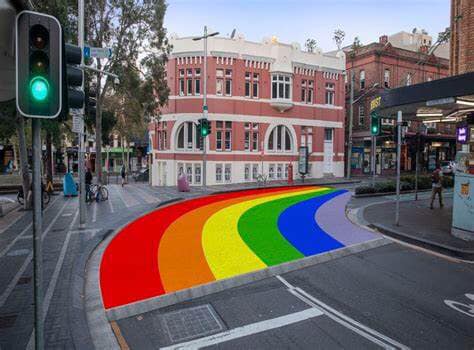
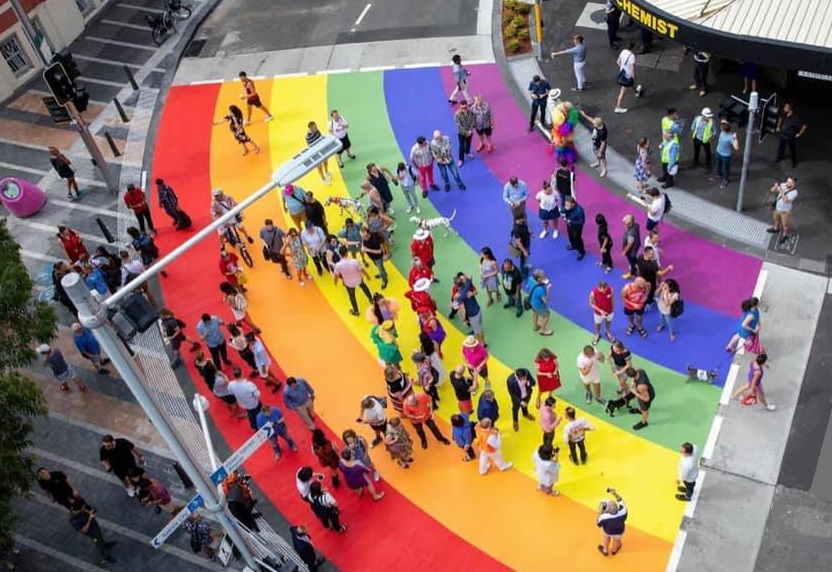
LGBTQ Community
Centers
New York City | LGBTQ
Community Center
Washington DC | DC
Center for the LGBTQ Community
Phildelphia | William
Way LGBTQ Community Center
Boston | BAGLY: Boston
Alliance of LGBTQ Youth
Chicago |
LGBTQ Center on Halsted
New Orleans |
LGBTQ Community Center
Memphis | Out
Memphis: LGBTQ Community Center of the MidSouth
Atlanta |
LGBTQ Institute
Birmingham | Magic City Acceptance Center
Gainesville |
Pride Community Center of North Central Florida
Winston-Salem
| North Star LGBTQ Community Center
Dallas |
LGBTQ Resource Center
Houston |
Montrose LGBTQ Center
Cleveland | LGBTQ
Center of Greater Cleveland
Milwaukee | LGBTQ
Community Center
Newark |
Newark LGBTQ Center
Hudson Valley |
Hudson Valley LGBTQ Community Center
Denver | LGBTQ
Center of Colfax
Seattle | Gay City:
Seattle's LGBTQ Center
San Francisco | SF
LGBTQ Center
San Diego | LGBTQ
Community Center
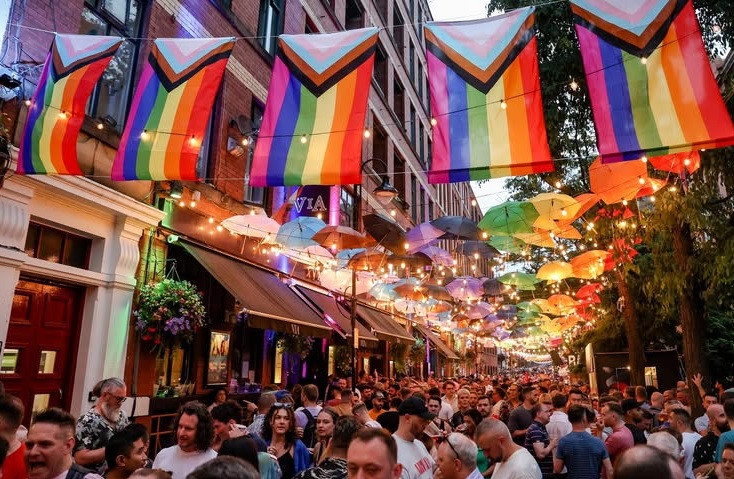
After Pride
Month, Let's Make Resolutions to Support Our Community
Resolutions will extend our pride past June and make us
see how our queerness enhances our lives daily.
Pride Month is over. The rainbows in store windows and
on garish socks have been cleared. This year, like the
others before it, there was a robust debate about the
commercialization of Pride (whether it’s a parade or
march or both) in fact, each year these tensions are the
perfect kickoff to Pride. But I am interested in the
time after Pride; what happens when our designated month
is over. I am calling for the institution of Pride
resolutions. Each year at the end of June, we should all
make a pledge to our queerness, a pact with our
community, and over the next 12 months in good faith
intend to fulfill it. It may be challenging like all
those things we promise ourselves on New Year’s — How
many new gym memberships go unused by March? How many
cigarettes still lit? — but one way to reclaim Pride
from the commercialization and frivolity is to turn it
toward good for our community and for ourselves.
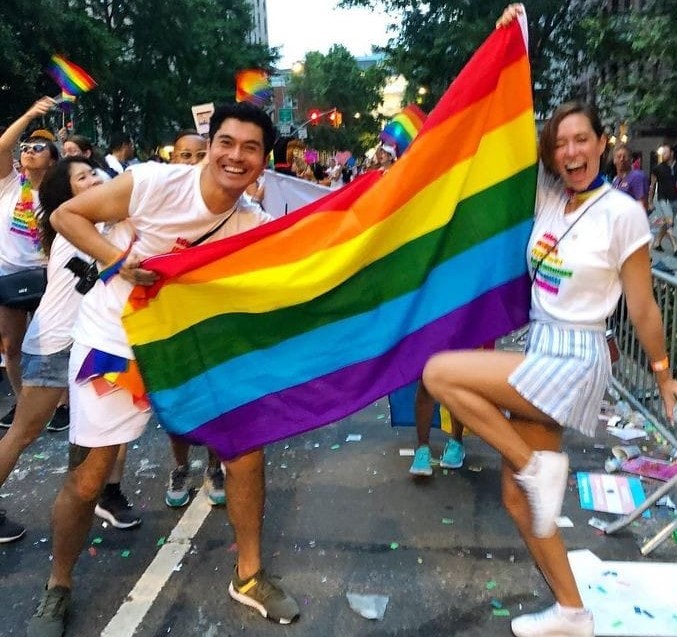
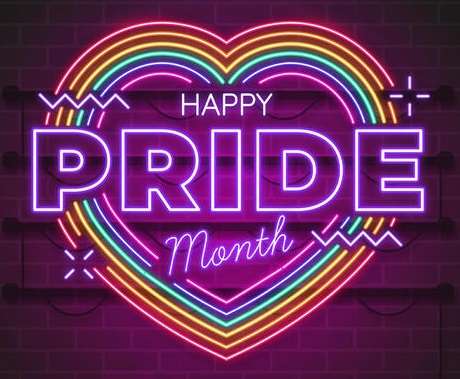
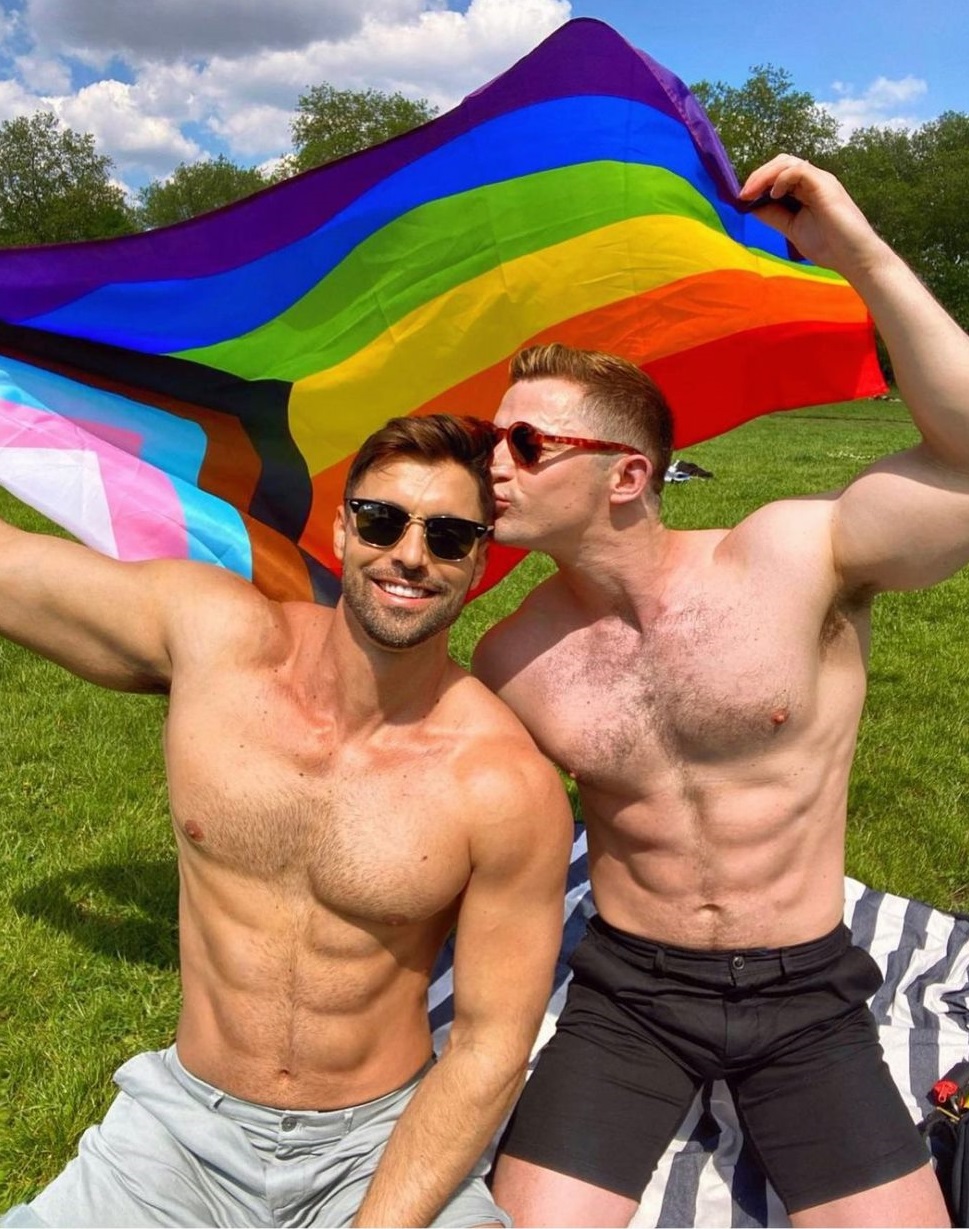

LGBTQ People are Marvels
Advocate: Queer People Have Always Existed
The Queer
Agenda: Essays by Shohreh Davoodi
78-Year-Old Man and 13-Year-Old Boy Talk
About Being Gay
Out 100: 2023 List of LGBTQ Celebrities
Celebrities You Didn’t Know are Gay,
Bisexual or Lesbian
World’s Biggest Queer Culture Museum is
in Australia
Lilly
Singh and Friends Celebrate Pride Month
Miriam Margolyes
Identifies as an Unapologetically Woke
Left-Wing Dyke
Advocate Mag: Why Do You
Have to Say They're Gay?
Brandi Carlile Receives
HRC Visibility Award
Queer
Quizzes
By making a Pride resolution, we will be expanding and
expending our pride beyond just the confines of June,
and we will see and feel how much our queerness enhances
our lives daily. Since it is the inauguration of
Pride resolutions, here are some examples to choose from
or to help spark your own.
I resolve to help fight every heinous anti-LGBTQ bill
everywhere (this year over 250 have been introduced in
state legislatures).
I resolve to take the first step toward a 12-step
program.
I resolve to read LGBTQ journalists so I get news about
us from us.
I resolve to shop at LGBTQ-owned and -operated
businesses.
I resolve to socialize in LGBTQ spaces.
I resolve to turn from LGBTQ ally to LGBTQ advocate.
I resolve to make one friend outside my own identity.
I resolve to help start a GSA at my school.
I resolve to take care of myself and my partners.
I resolve to bring my queerness to bear on everything I
do.
I resolve to start therapy and set aside the shame
others have placed upon me.
I resolve to be kind on hookup apps and not treat
everyone like they are expendable.
I resolve to not treat myself as expendable.
I resolve to learn LGBTQ history, not as homework, but
to understand the long line of extraordinary individuals
that I am among.
I resolve to read queer books, watch queer movies, and
expose myself to queer artists so I can see myself in
the entertainment I consume.
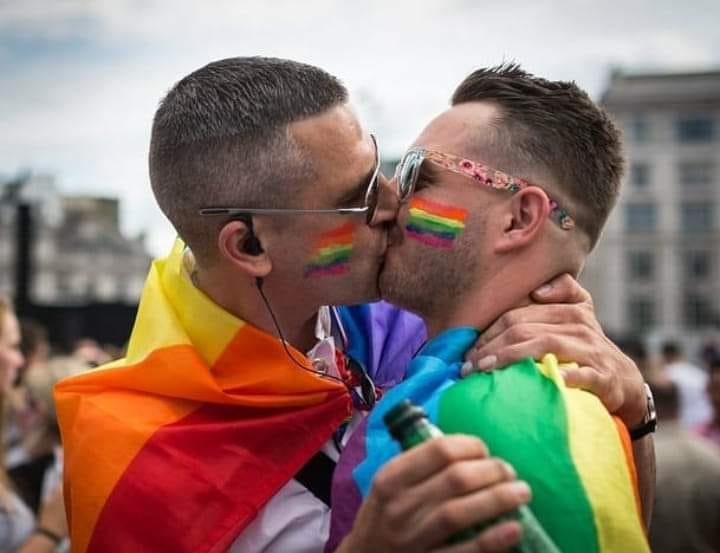
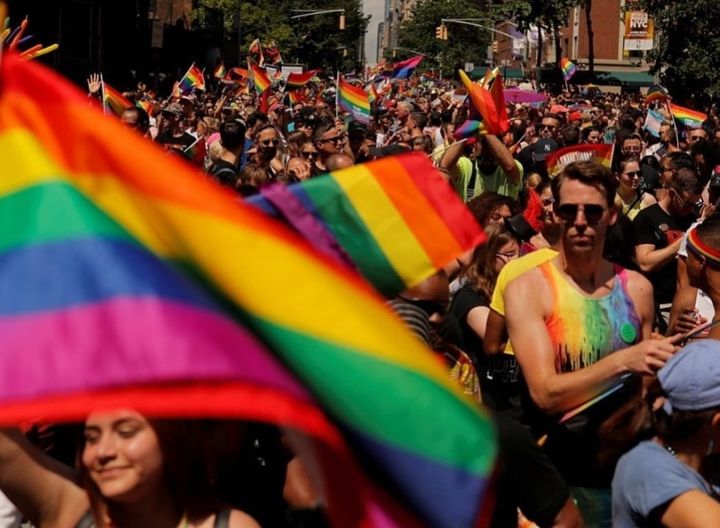
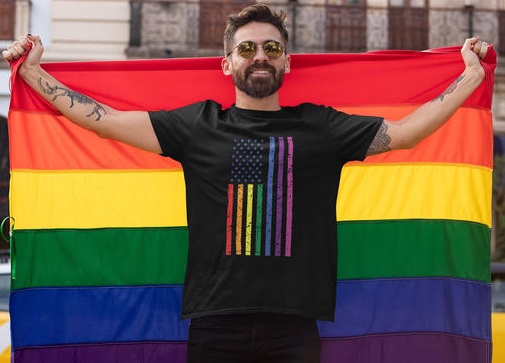
Government Report: LGBTQ Youth Information
LGBTQ Writers, Artists and
Activists of the 80s and 90s
New Research: Gay Men and Stress
Our Trans Daughter: Jamie and Rebekah
GLAAD Annual Report: Accelerating Acceptance 2019
LGBTQ Voices: Learning
From Lived Experiences
Pew Research Center: LGBTQ Social and Demographic Trends
Queer View
Mirror
Politico: LGBTQ Community Stories
National Survey: State of
the LGBTQ Community in 2020
LGBTQ Voices: Learning
From Lived Experiences
Invisible
Histories Project
I resolve to ask for help.
I resolve to come out to at least one person if I’m
ready.
I resolve to join one LGBTQ service organization.
I resolve to work to get my local schools to teach LGBTQ
history.
I resolve to work to get my local schools to teach
inclusive sex ed.
I resolve to ask people their pronouns.
I resolve to help more people to learn about PrEP.
I resolve to not let the government or drug companies
off the hook on finding a vaccine for HIV.
I resolve to listen to and amplify the voices of our
most vulnerable.
I resolve to care for and about our long-term survivors.
I resolve not to minimize or diminish my queerness in
order to go along to get along.
I resolve to make LGBTQ issues central to how I choose a
candidate.
I resolve to run for office.
I resolve to stop my company’s pinkwashing.
I resolve to raise my LGBTQ child to understand that
their queerness is their superpower.
I resolve to understand I am a stakeholder to everything
that happens to all LGBTQ people everywhere.
I resolve not to measure myself against images I see
online.
I resolve to treat myself kindly.
I resolve to treat others kindly.
I resolve to enjoy sex.
I resolve to try to be intimate.
I resolve to risk my heart and love.
I resolve to allow myself to be loved.
[Source:
Richie Jackson, Advocate Magazine, July 2021]



Star-Studded GLAAD Media Awards in New York City
Out 100: 2023
List of LGBTQ Celebrities
Gen Z: The Queerest Generation Yet
Smoking Hot Gen Z Celebs Who Prove The Future Is Queer
National Survey: State of
the LGBTQ Community in 2020
Pew Research Center: Global Divide on Homosexuality
LGBTQ Celebrities Who Came
Out in 2020
Government Report: LGBTQ Youth Information
LGBTQ Writers, Artists and
Activists of the 80s and 90s
New Research: Gay Men and Stress
GLAAD Annual Report: Accelerating Acceptance 2019
LGBTQ Voices: Learning
From Lived Experiences
Pew Research Center: LGBTQ Social and Demographic Trends
National Survey: State of
the LGBTQ Community in 2020
LGBTQ Voices: Learning
From Lived Experiences
State of the
LGBTQ Community in 2020
A National Public Opinion Survey: A Comprehensive New
Study from the Center for American Progress
Overall,
this study finds that many LGBTQ people continue to face
discrimination in their personal lives, in the workplace
and the public sphere, and in their access to critical
health care. This experience of discrimination leads to
many adverse consequences for their financial, mental,
and physical well-being. Many LGBTQ people report
altering their lives to avoid this discrimination and
the trauma associated with unequal treatment. Younger
generations generally report higher levels of
discrimination and attendant problems than do older
generations, and problems associated with discrimination
are most pronounced among transgender individuals,
individuals of color, and disabled individuals. Anxiety
about the coronavirus adds another layer of concern in
this community, particularly among those respondents who
are the most exposed in terms of their health or
front-line employment status.
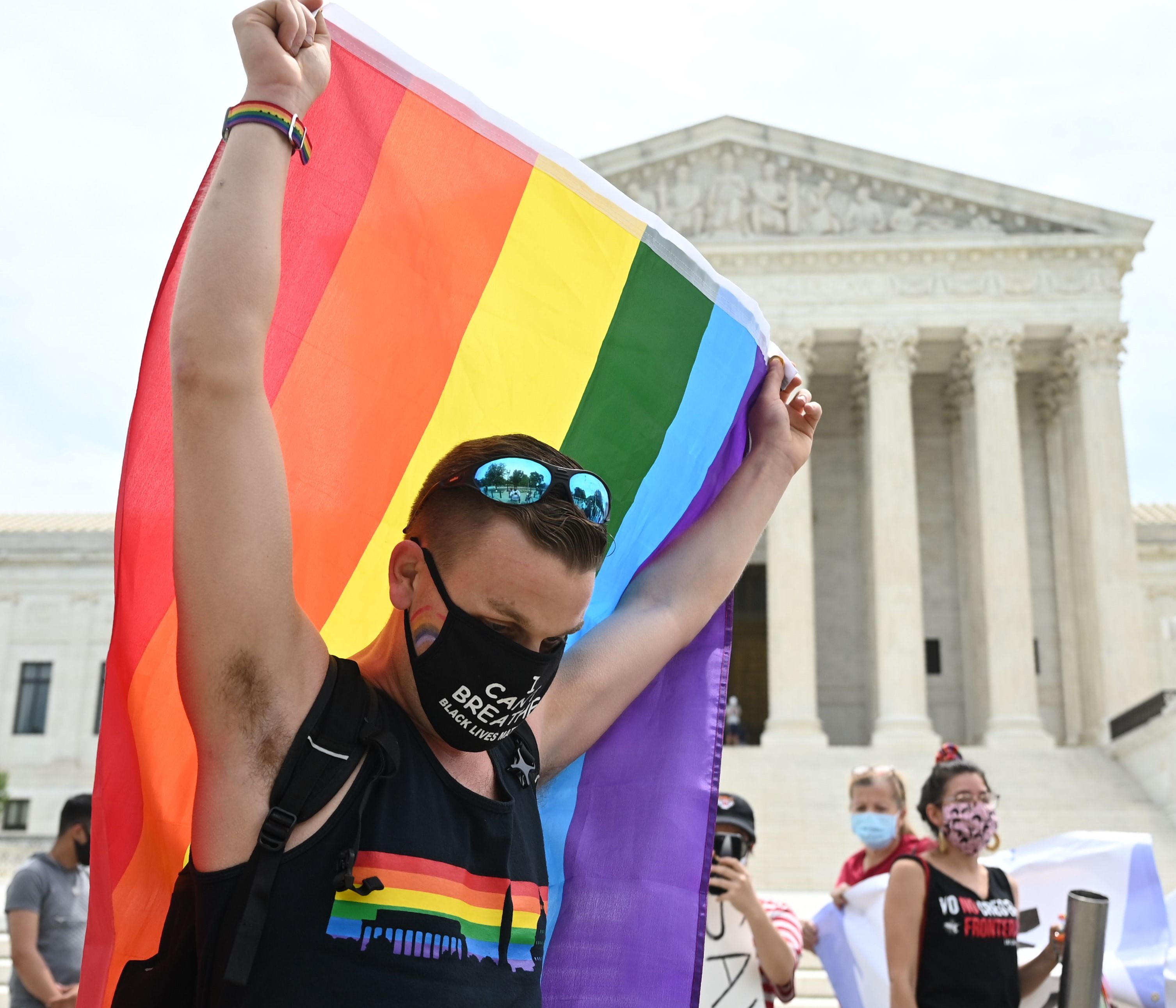
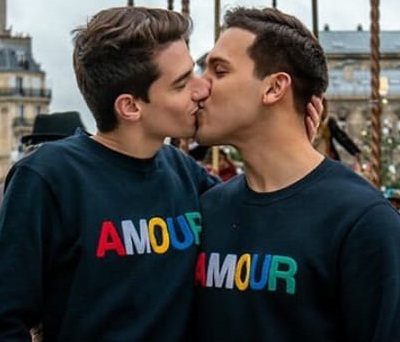
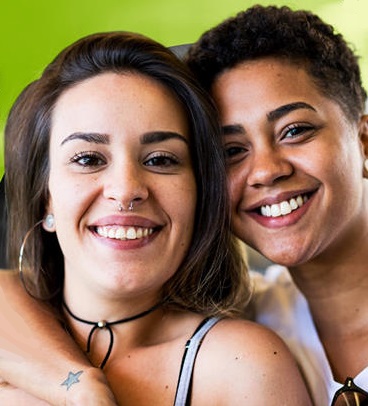
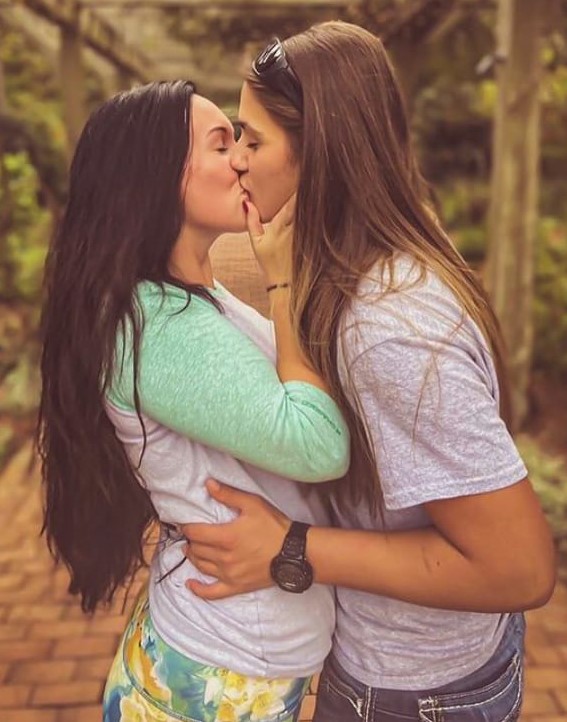
IMDB:
Famous LGBTQ Celebrities
List: Notable Gay, Lesbian and Bisexual People
Great Queers of History: Parts 1, 2, 3
Info: LGBTQ History
Video List: Famous LGBTQ Folk
Celebrities You Didn’t Know are Gay, Bisexual or Lesbian
Listal: Gay and Lesbian Celebrities
Famous LGBTQ People: Queer Historical Icons
Gay Kings and Queens of Europe
World’s Biggest Queer Culture Museum is in Australia
Huff Post: Queer Celebrities
Video List: Top Ten Most Influential LGBTQ Celebrities
Info: Famous LGBTQ People
Advocate Mag: Why Do You Have to Say
They're Gay?
The remainder of this report will explore the results of
the study across major areas such as experiences of
overall discrimination, health care-specific
experiences, avoidance behaviors, and the effects of the
pandemic on LGBTQ Americans’ mental health. Major
findings from the survey include:
--More than 1 in 3 LGBTQ Americans faced discrimination
of some kind in the past year, including more than 3 in
5 transgender Americans.
--Discrimination adversely affects the mental and
economic well-being of many LGBTQ Americans, including 1
in 2 who report moderate or significant negative
psychological impacts.
--To avoid the experience of discrimination, more than
half of LGBTQ Americans report hiding a personal
relationship, and about one-fifth to one-third have
altered other aspects of their personal or work lives.
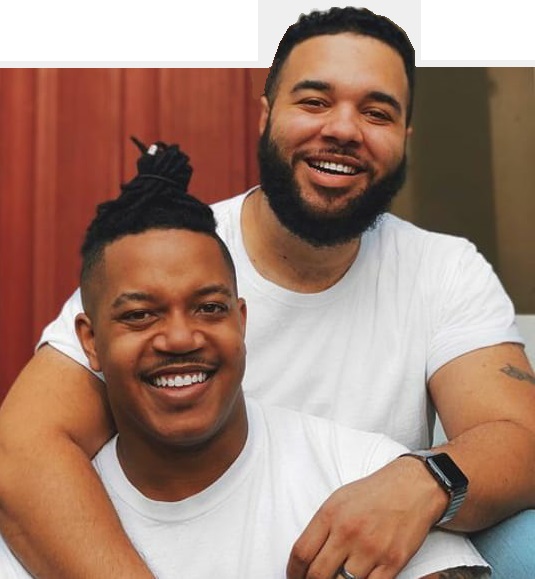
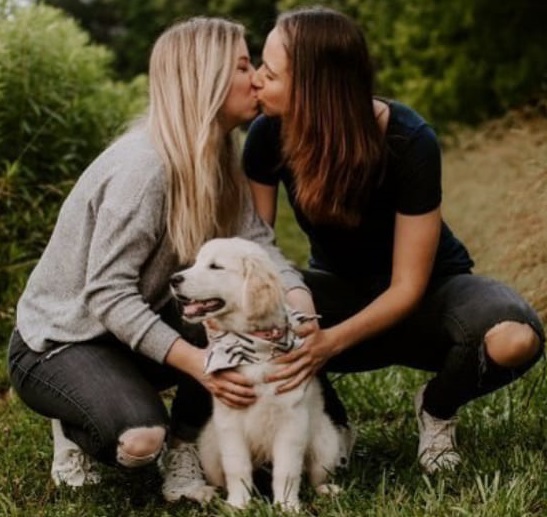
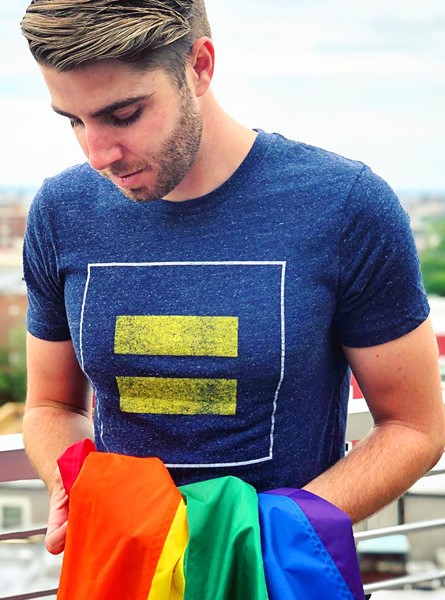
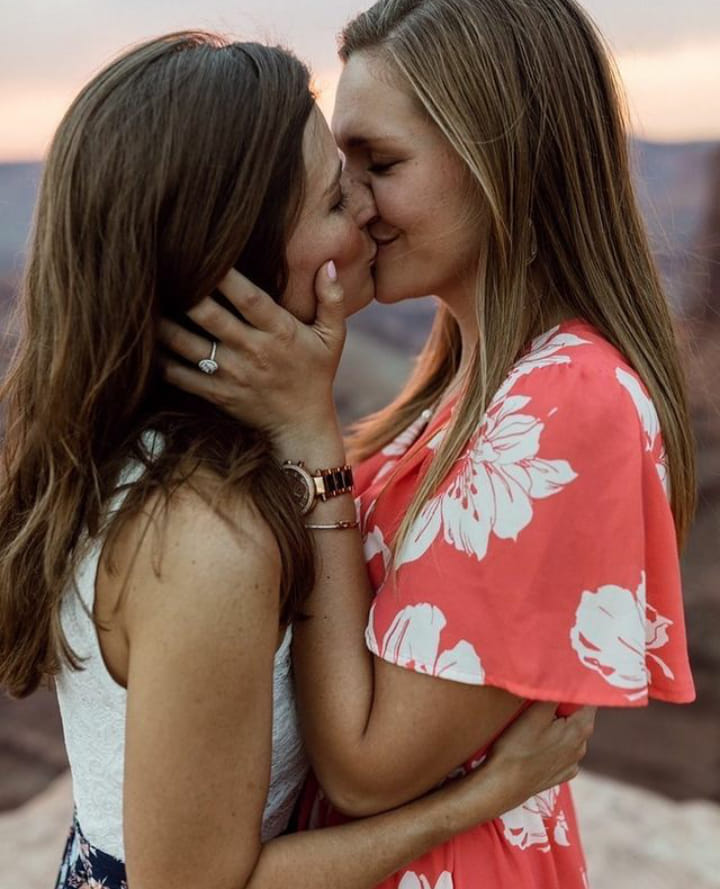
Out 100: 2023
List of LGBTQ Celebrities
LGBTQ Celebrities Who Are Out and Proud
Smoking Hot Gen Z Celebs Who Prove The Future Is Queer
Gen Z: The Queerest Generation Yet
100 Gay Things To Do Before You Die
78-Year-Old Man and 13-Year-Old Boy Talk About Being
Gay
LGBTQ Pride Started With Protest
How Well Do You Know Your Pride Flags?
LGBTQ People Have Been Around Forever,
Historians Say
Queer Majority: Essays, Articles, Issues
LGBTQ People Have Been Around Forever,
Historians Say
--Around 3 in 10 LGBTQ Americans faced difficulties last
year accessing necessary medical care due to cost
issues, including more than half of transgender
Americans.
--15 percent of LGBTQ Americans report postponing or
avoiding medical treatment due to discrimination,
including nearly 3 in 10 transgender individuals.
--Transgender individuals faced unique obstacles to
accessing health care, including 1 in 3 who had to teach
their doctor about transgender individuals in order to
receive appropriate care.
--LGBTQ Americans have experienced significant mental
health issues related to the COVID-19 pandemic.




This
report is an overview of survey responses, covering
several major demographic differences within the LGBTQ
community. These findings provide crucial insights into
the experiences of LGBTQ people to inform policy
responses to the disparities highlighted and avenues for
future research. The Center for American Progress plans
to track these attitudes and experiences over time to
assist policymakers and leaders in their efforts to
ensure full participation and equality for all LGBTQ
people, both legally and in their daily lives.
[Source: Sharita Gruberg, Lindsay Mahowald, John Halpin,
Center for American Progress, October 2020]
New Research: Gay Men and Stress
GLAAD Annual Report: Accelerating Acceptance 2019
Pride
Primer
Advocate Mag: Why Do You Have to Say
They're Gay?
LGBTQ Voices: Learning
From Lived Experiences
Pew Research Center: LGBTQ Social and Demographic Trends
The Legacy Project
I Support the LGBTQ Community
Man Paints House Rainbow Colors as Revenge to Anti-Gay
Neighbor
National Survey: State of
the LGBTQ Community in 2020
LGBTQ Voices: Learning
From Lived Experiences
What is a Gayborhood?
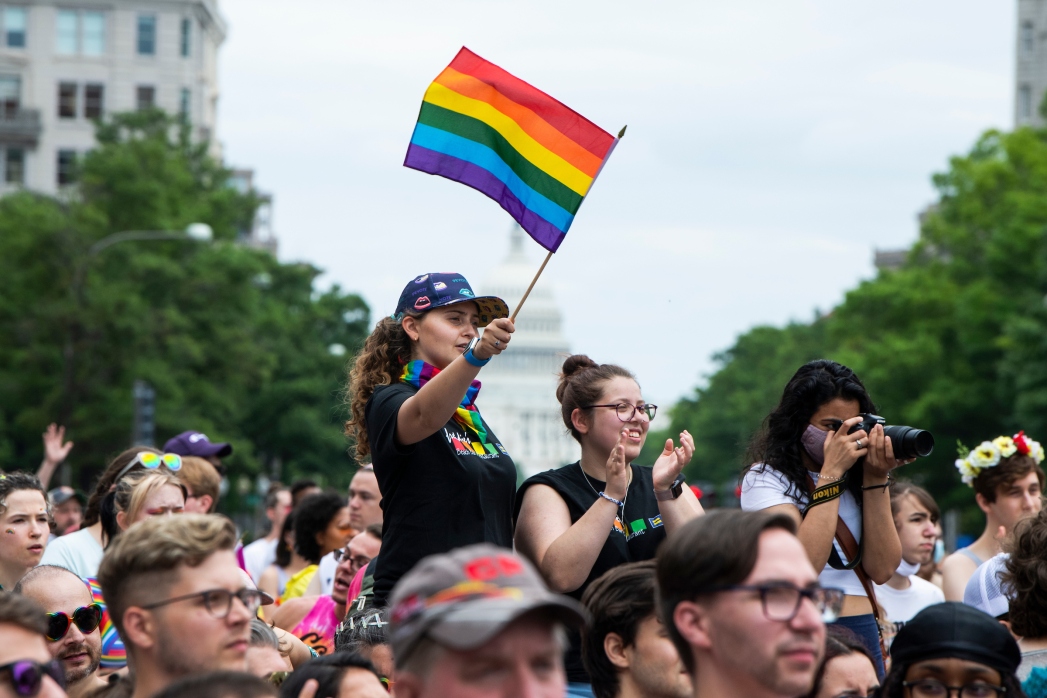
Acceptance and
Equality in the LGBTQ Community
Equality of LGBTQ People
The
history of the LGBTQ community is complex, because in
the past society did not perceive lesbian, gay,
bisexual, transgender, and queer people as a norm.
Despite the fact that according to the Declaration of
Independence, “all men are created equal,” the LGBTQ
community still has to struggle for true equality. Over
the years there have been various forms of LGBTQ
discrimination. It varies from an unfriendly attitude to
such serious problems as the refusal to employ LGBTQ
individuals. Clearly discrimination, and unfair and
oppressive treatment, has been, and in some cases, still
is, an ongoing and persistent problem for those who
belong to the LGBTQ community. However, the LGBTQ
acceptance process observed during the last few years
proves that the LGBTQ community will achieve real
equality in the near future.
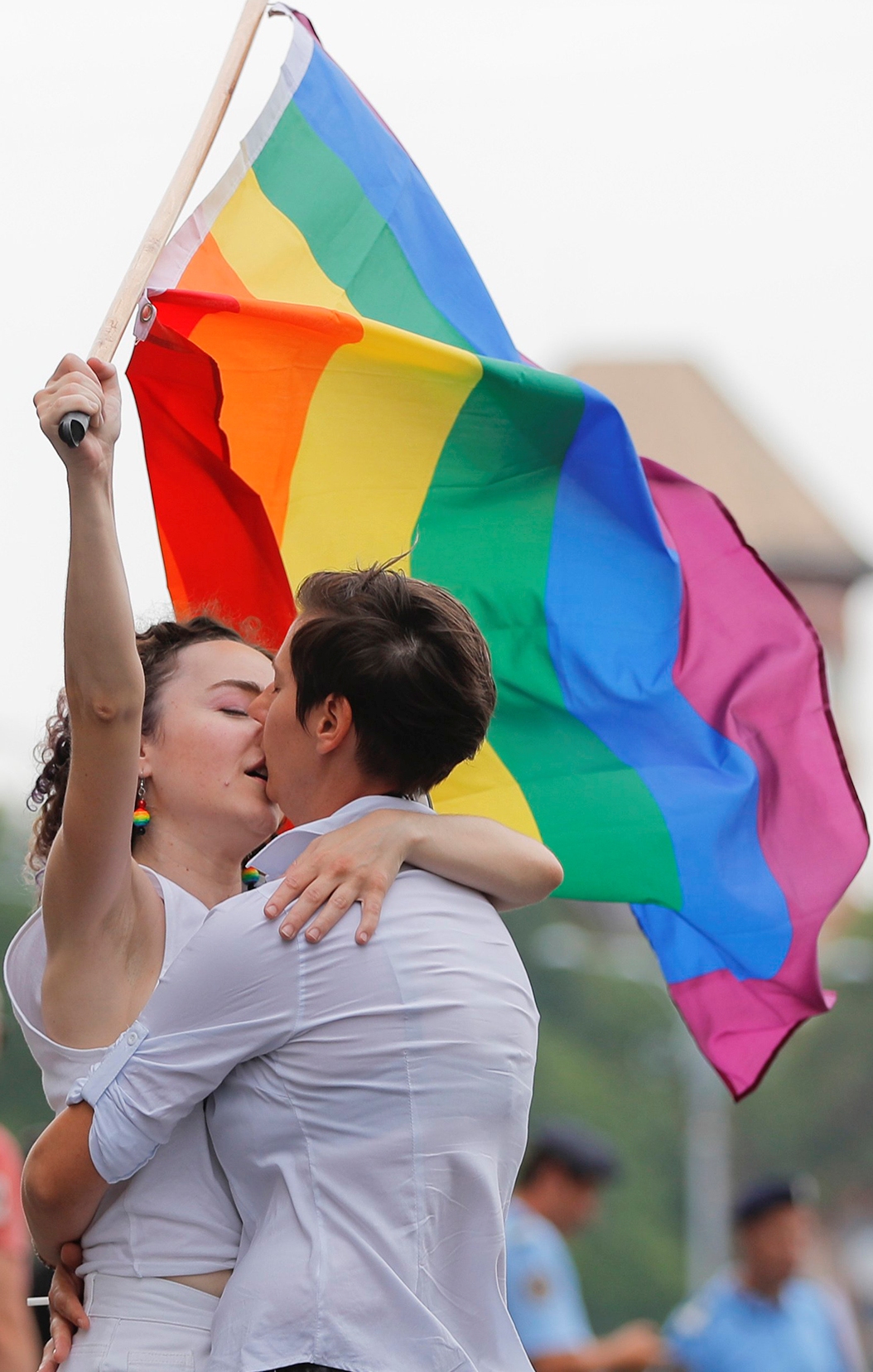
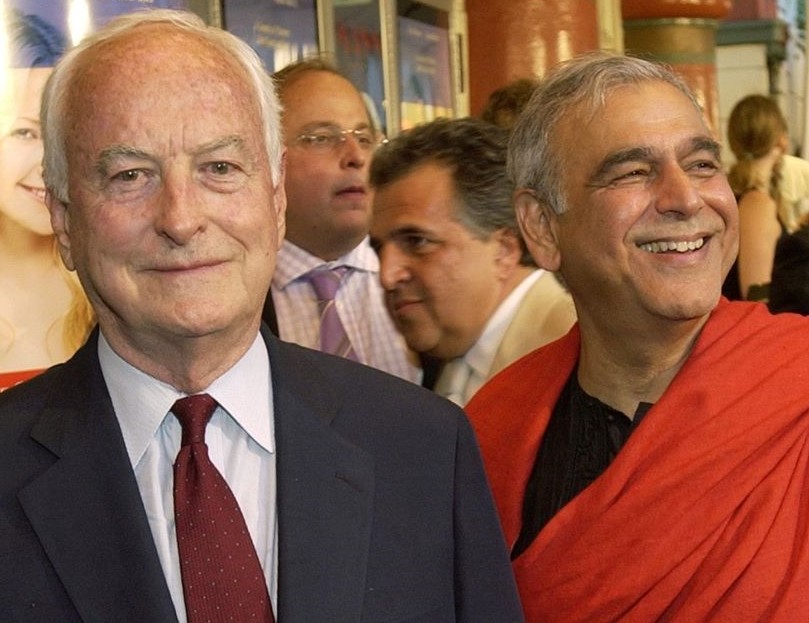
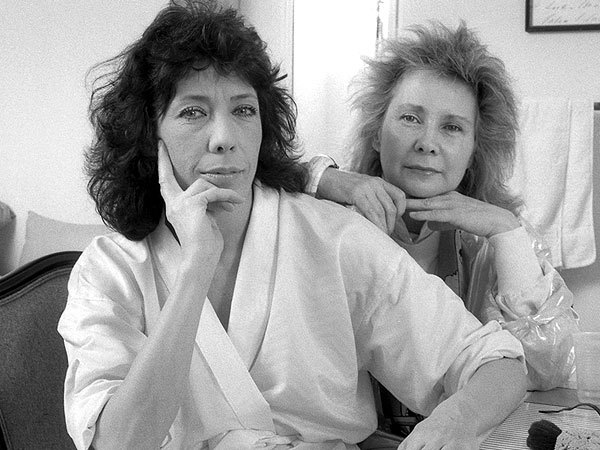
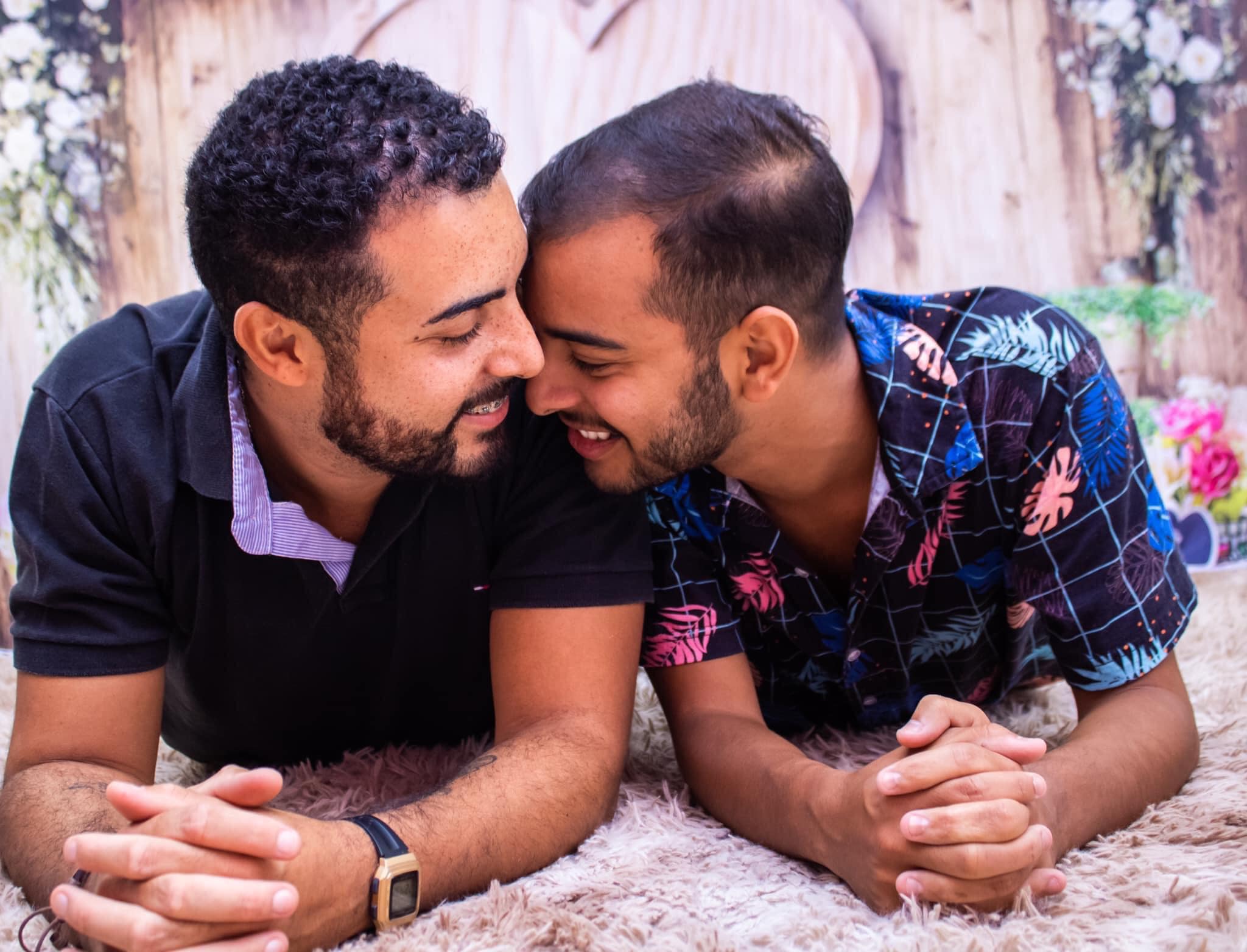
LGBTQ People Have Been Around Forever,
Historians Say
National Survey: State of
the LGBTQ Community in 2020
Pew Research Center: Global Divide on Homosexuality
Rebekah's Story
What Does It Really Mean to Be Queer?
Queer View
Mirror
Government Report: LGBTQ Youth Information
Accepting Oneself
When an
individual realizes that his/her sexual orientations are
different from those considered normal by society,
he/she may have some personal difficulty admitting such
a fact. Some people start questioning their sexuality
and some try to hide it so as not to be rejected by the
society. According to a survey conducted among adult
members of the LGBTQ community, almost 40% stated that
they were not accepted by their family or friends due to
their gender identity or sexual orientation. Such
situations cause serious self-acceptance and self-esteem
problems in the LGBTQ community, which can lead to
depression. According to the survey, only 56% of
individuals informed their mothers about their sexual
orientation and less than 40% were courageous enough to
tell this to their fathers. The fact that people with
non-traditional orientations and identities had to
struggle to inform their parents about their orientation
proves that LGBTQ members have to overcome more
obstacles in order to become open about their sexuality
in public. Consequently, the full equality of the LGBTQ
community remains under the question even today.
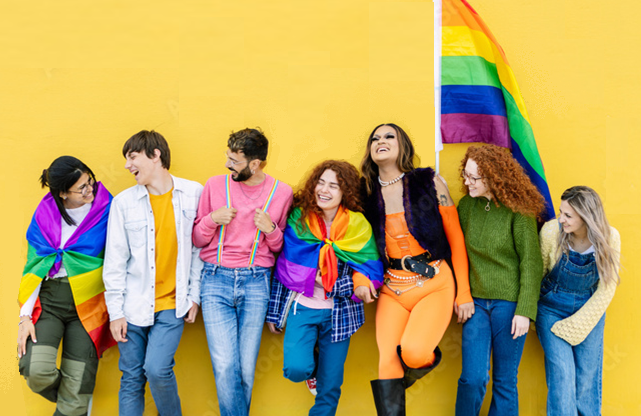
Discrimination Issues
The
discrimination of LGBTQ people is a serious concern in
all areas of LGBTQ life. For those individuals who
consider themselves homosexual or still have to
understand and accept their non-traditional sexual
orientation, social discrimination, homophobia, and
other forms of heterosexism and oppression, is their
major fear. Although the societal situation has greatly
improved, openly LGBTQ people are still at risk, in
certain sectors, of receiving unfriendly stares or even
negative remarks regarding their sexual orientation.
Many traditionally-minded people feel uncomfortable
about the LGBTQ topic, so they choose not to accept
rather than to seek to understand. The American Civil
Liberties Union has made it clear that discrimination
based on gender identity or sexual orientation is
illegal. Such organizations as ACLU are focused on
raising awareness regarding this problem and they seek
to inform the public about how it can impact business,
employment, housing, social systems, and work
environments and many other daily life aspects. And the
harmful effects of LGBTQ discrimination are not limited
to the individual. This problem has considerable effects
on all of society.
LGBTQ: Acronyms and Words
Words Words
How Well Do You Know Your Pride Flags?
Advocate Mag: Why Do You Have
to Say They're Gay?
DotGay Dictionary: Who Are Your LGBTQ
Role Models?
Jessica: Are Labels
Important?
Smoking Hot Gen Z Celebs Who Prove The Future Is Queer
78-Year-Old Man and 13-Year-Old Boy Talk About Being Gay
Bowie's Story
Celebrities You Didn’t Know are Gay, Bisexual or Lesbian
Info: LGBTQ Biographies
Celebrating LGBTQ
Trailblazers
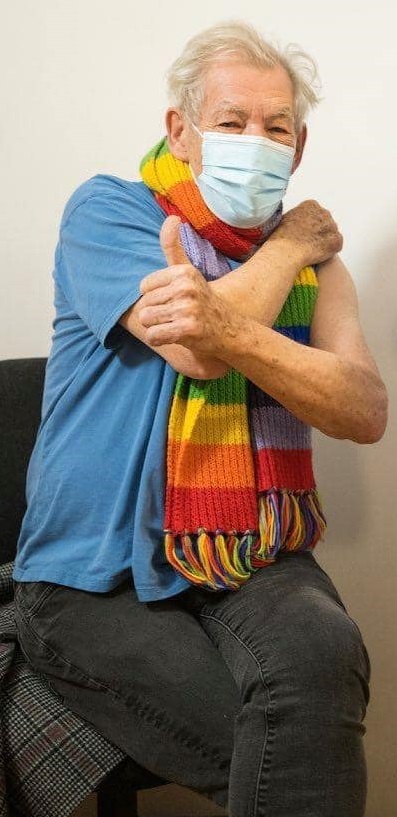
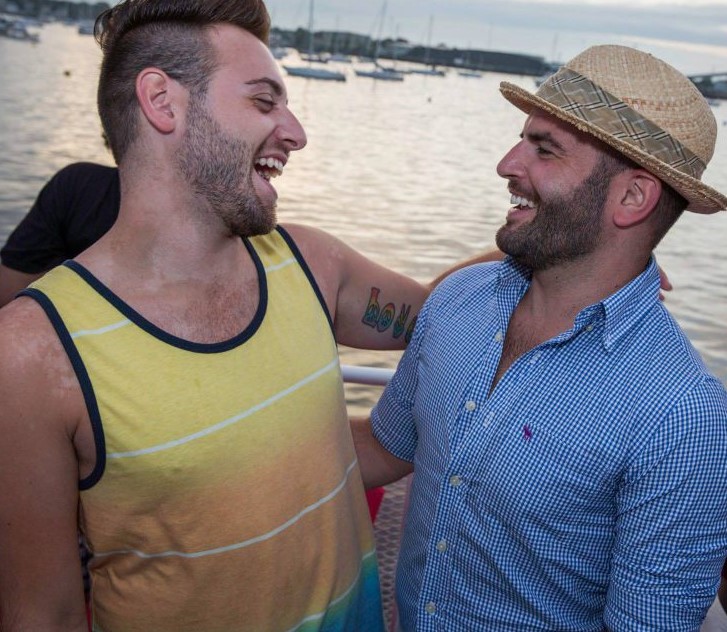
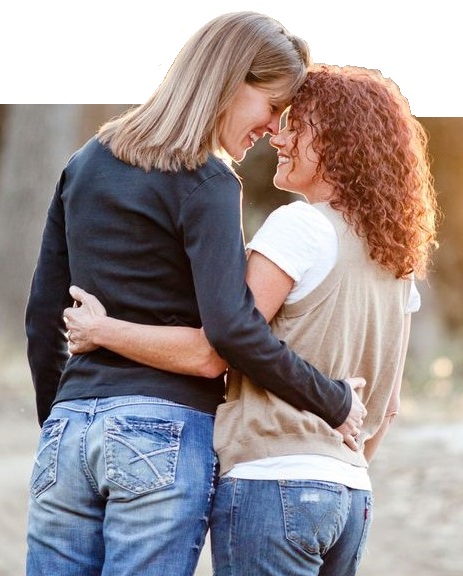
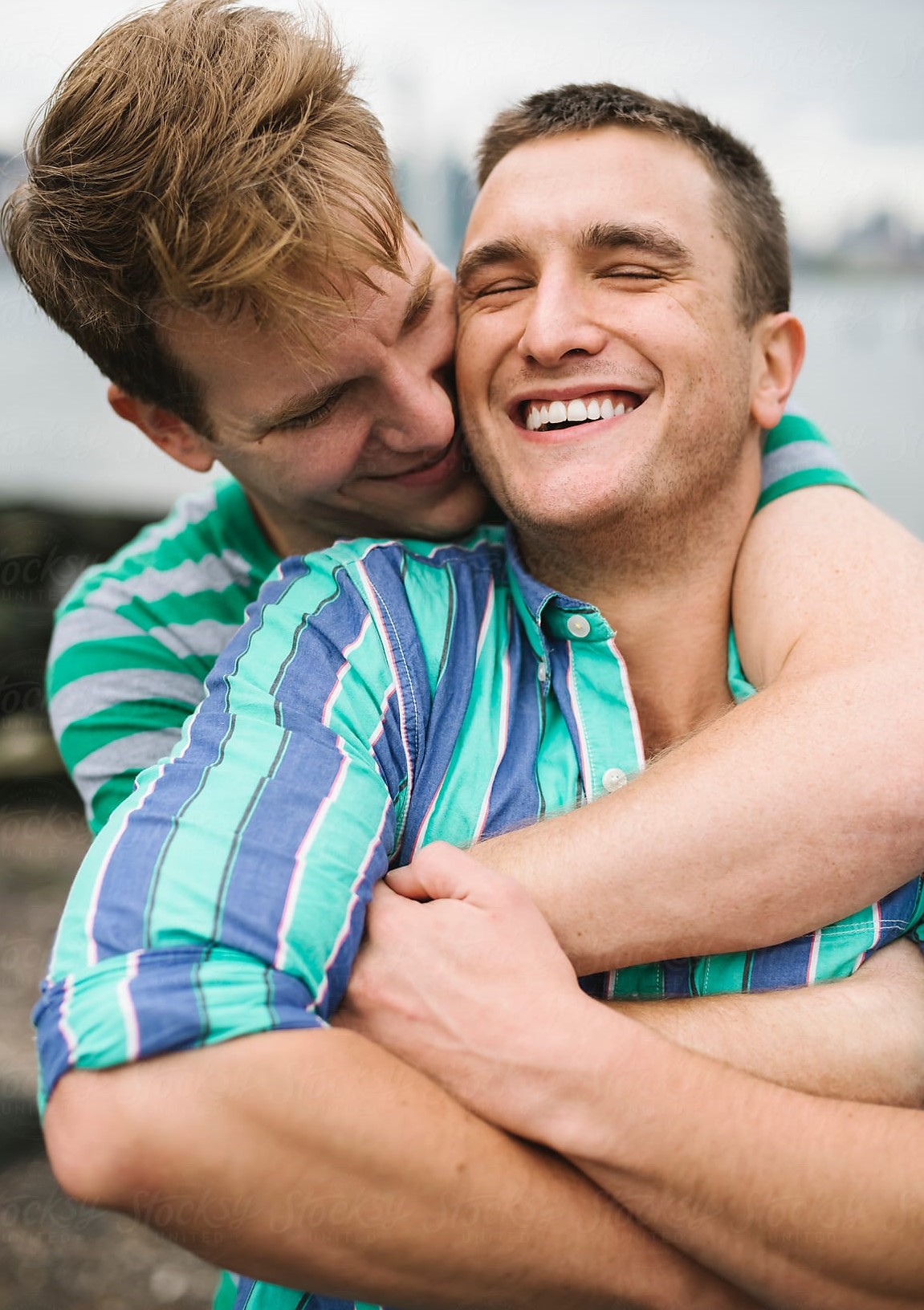
Acceptance Issues
An online
survey was conducted among the LGBTQ members and almost
90% admitted that modern society has become more
accepting during the last few years. They are also
positive about the fact that the LGBTQ acceptance will
continue to increase over the years. Such results show
that LGBTQ equality is a real and achievable task.
Despite the fact that we can see some progress in the
acceptance of the LGBTQ community, it is still
considered to be slow and controversial. Gary J. Gates,
a researcher at the Williams Institute, says, that
stigmatization of the LGBTQ community will continue in
some form even as societal acceptance improves. But, the
more the LGBTQ community feels accepted, the more
individuals will become open about their sexual
orientation.
What
Changes will Occur?
LGBTQ
community still faces discrimination in some sectors on
a daily basis, which shows that equality has not yet
been fully achieved. However, there are many positive
signs for the LGBTQ community. The recent legalization
of same-sex marriage is an important milestone in LGBTQ
equality. The increase in LGBTQ visibility in the media
(including television, film, and music) has been a
positive step in normalizing the queer experience. LGBTQ
individuals in prominent positions in business and
politics have yielded positive role models. The latest
generation of young people seem to be more open-minded
than their parents about LGBTQ issues. And it appears,
with the growing acceptance of LGBTQ rights, that
controversy about LGBTQ equality will not even be an
issue in the future.
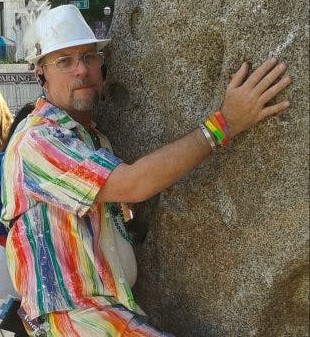
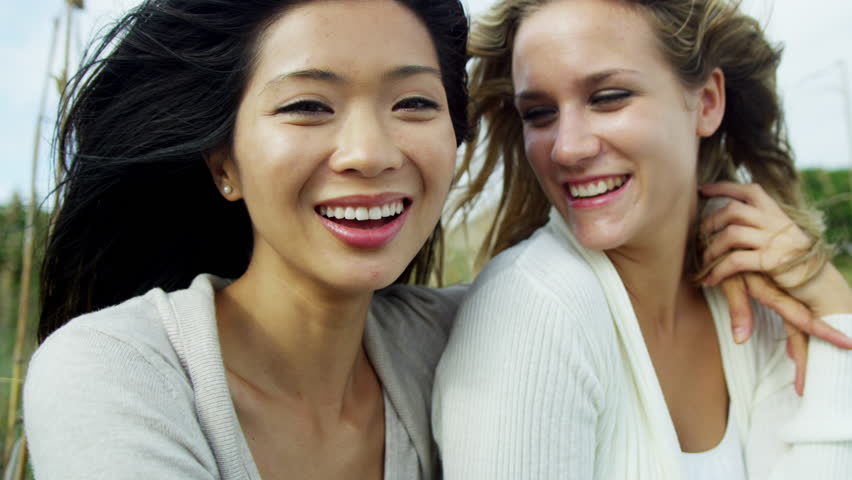
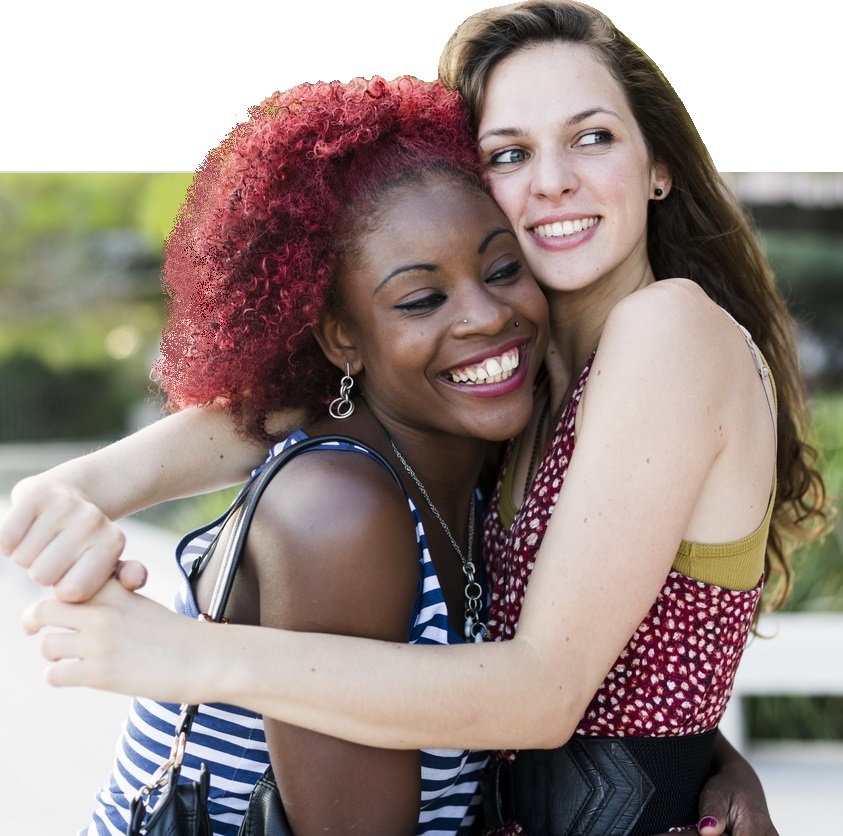
Love Bravely: Mini LGBTQ Documentary
LGBTQ Alphabet
Famous LGBTQ People Everywhere
Census Estimate: One Million LGBTQ Households in America
Queer Daze
Mojo: Most Inspirational
LGBTQ Celebrities
Queer Majority: Articles
and Issues
Sophia's Story
Advocate: Lessons From
Stonewall
Wikipedia: LGBTQ Culture
LGBTQ Voices: Learning
From Lived Experiences
Video: How You See Me
Info: History of the LGBTQ Movement
Advocate: How to Be More
Out and Proud in Your Everyday Life
Politico: LGBTQ Community Stories
Ellen: Best of LGBTQ Pride
Shear's Story
List: Famous LGBTQ People
How Harvey Milk Changed the Gay Rights Movement
Video List: Famous LGBTQ Folk
Wikipedia: LGBTQ Community
Invisible
Histories Project
Profile of LGBTQ Community
According to the 2015 Pew Research Center survey, an
overwhelming share of America’s lesbian, gay, bisexual,
transgender, and queer adults (92%) say society has
become more accepting of them in the past decade and an
equal number expect it to grow even more accepting in
the decade ahead. They attribute the changes to a
variety of factors, from people knowing and interacting
with someone who is LGBTQ, to advocacy on their behalf
by high-profile public figures, to LGBTQ adults raising
families.
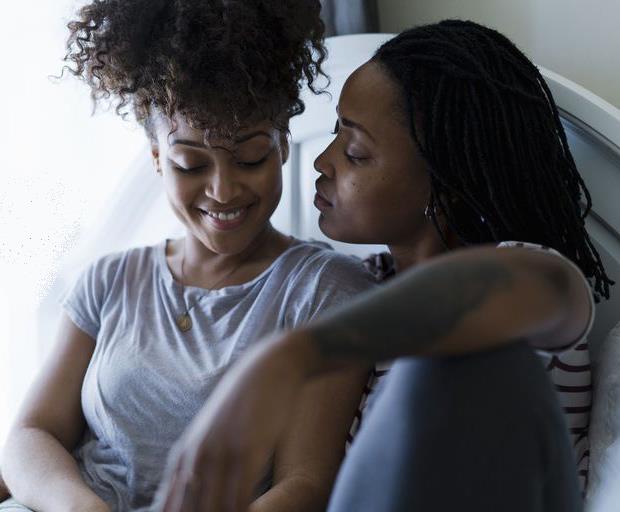
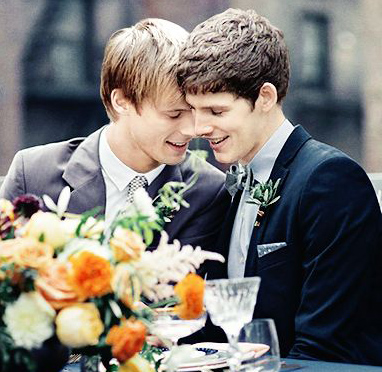
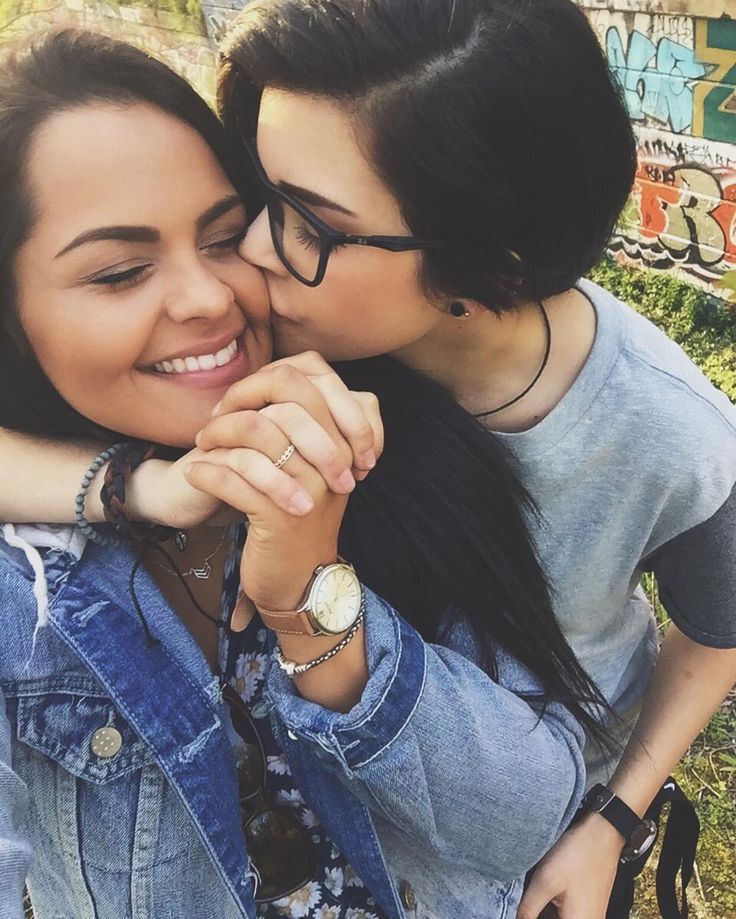
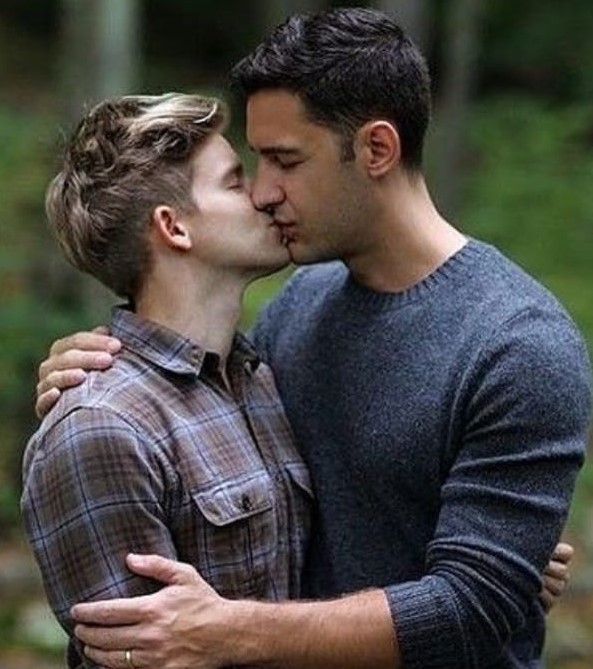
At the same time, however, a new nationally
representative survey of 1,197 LGBTQ adults offers
testimony to the many ways they feel they have been
stigmatized by society. About four-in-ten (39%) say that
at some point in their lives they were rejected by a
family member or close friend because of their sexual
orientation or gender identity. 30% say they have
been physically attacked or threatened. 29% say
they have been made to feel unwelcome in a place of
worship. And 21% say they have been treated
unfairly by an employer. About six-in-ten (58%) say
they’ve been the target of slurs or jokes.
The survey finds that 12 is the median age at which
lesbian, gay and bisexual adults first felt they might
be something other than heterosexual or straight. For
those who say they now know for sure that they are
lesbian, gay, bisexual, transgender, or queer, that
realization came at a median age of 17. Among those who
have shared this information with a family member or
close friend, 20 is the median age at which they first
did so.
Wikipedia:
LGBTQ
Rebekah's Story
LGBTQ People are Marvels
Advocate Mag: Why Do You Have to Say
They're Gay?
Sporcle: LGBTQ Trivia Quizzes and Games
PBS: LGBTQ America by the Numbers
Video: LGBTQ Facts to Celebrate
The Legacy Project
How Harvey Milk Changed the Gay Rights Movement
Story Corps: LGBTQ Stories
Faces: Can You See Past the Label?
Gen Z: The Queerest Generation Yet
Celebrities You Didn’t Know are Gay, Bisexual or Lesbian
Our Trans Daughter: Jamie and Rebekah
Demographics: How Gay is America?
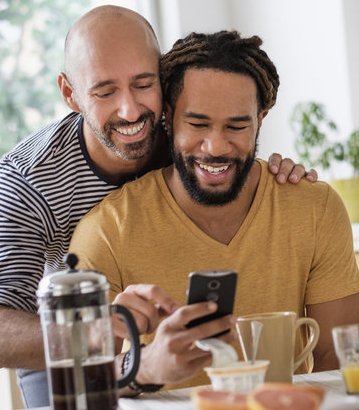
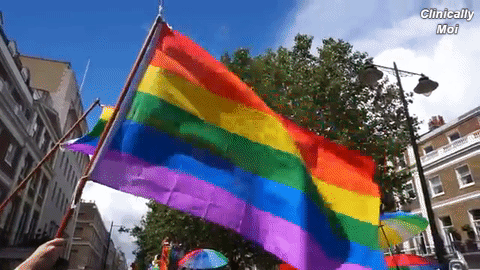
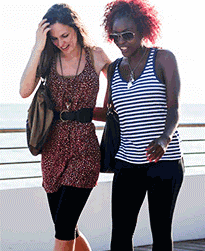
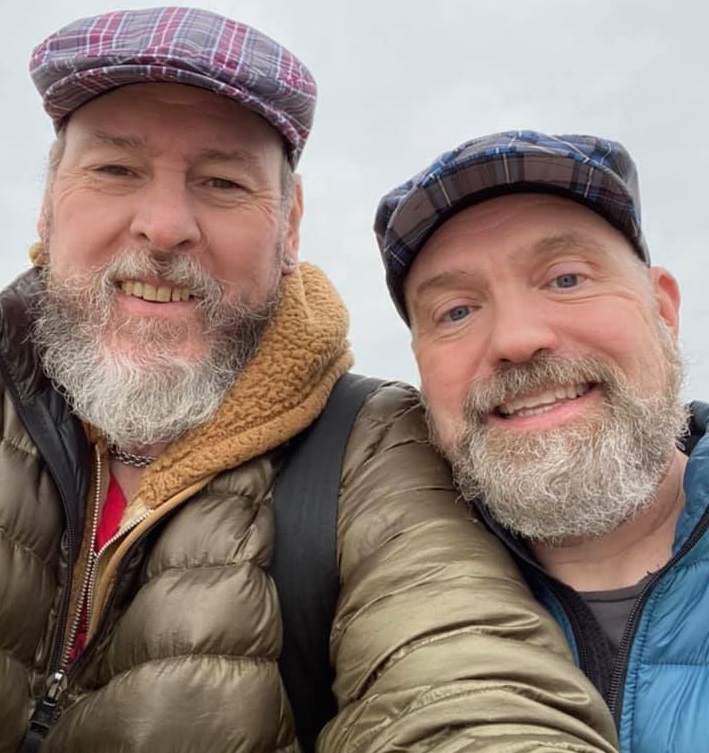
The survey finds that the LGBTQ population is
distinctive in many ways beyond sexual orientation.
Compared with the general public, Pew Research LGBTQ
survey respondents are more liberal, more Democratic,
less religious, less happy with their lives, and more
satisfied with the general direction of the country. On
average, they are younger than the general public. Their
family incomes are lower, which may be related to their
relative youth and the smaller size of their households.
They are also more likely to perceive discrimination not
just against themselves but also against other groups
with a legacy of discrimination.
The survey finds that 16% of LGBTQ adults (mostly
bisexuals with opposite-sex partners) are currently
married, compared with about half the adults in the
general public. Overall, a total of 60% of LGBTQ survey
respondents are either married or say they would like to
marry one day, compared with 76% of the general public.
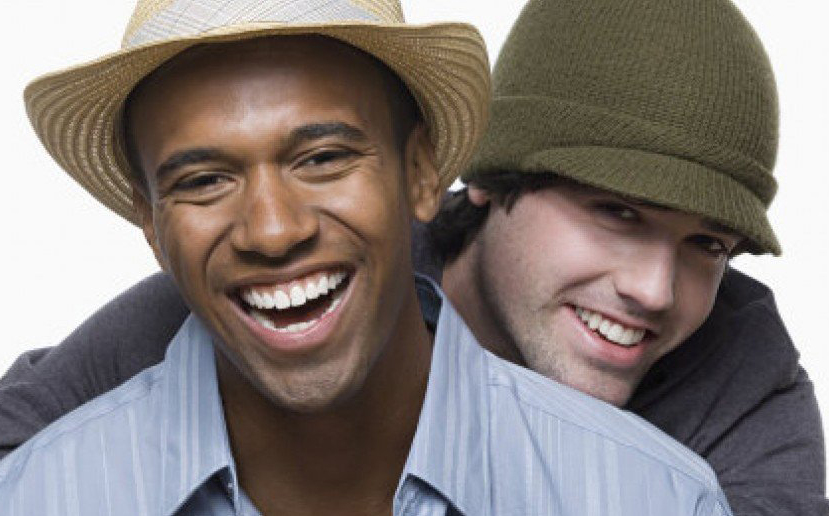
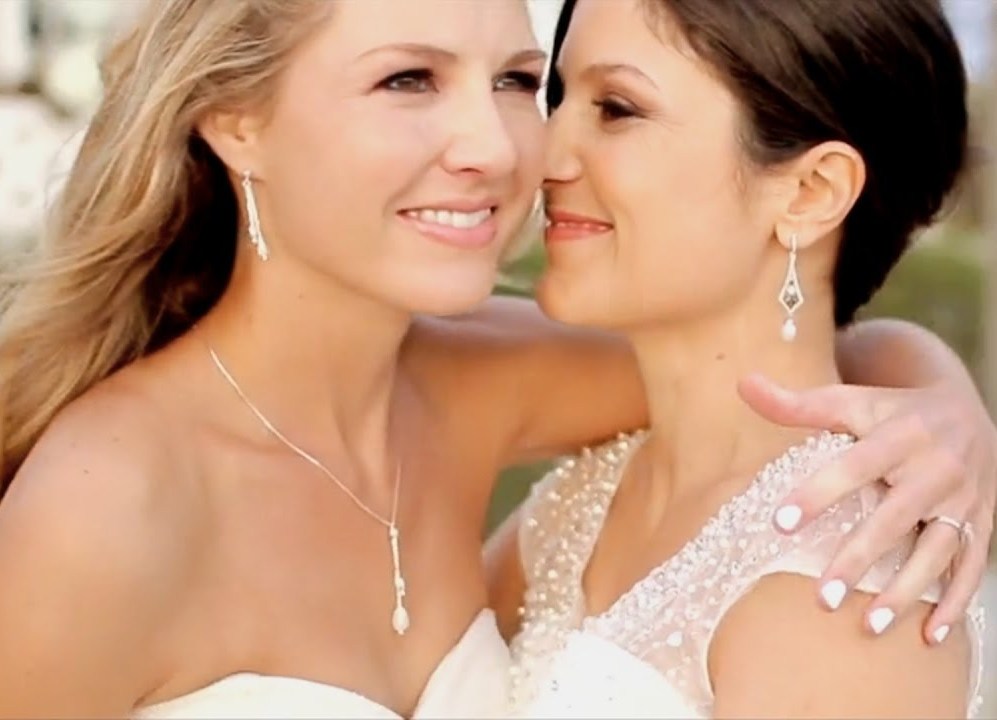
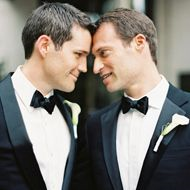
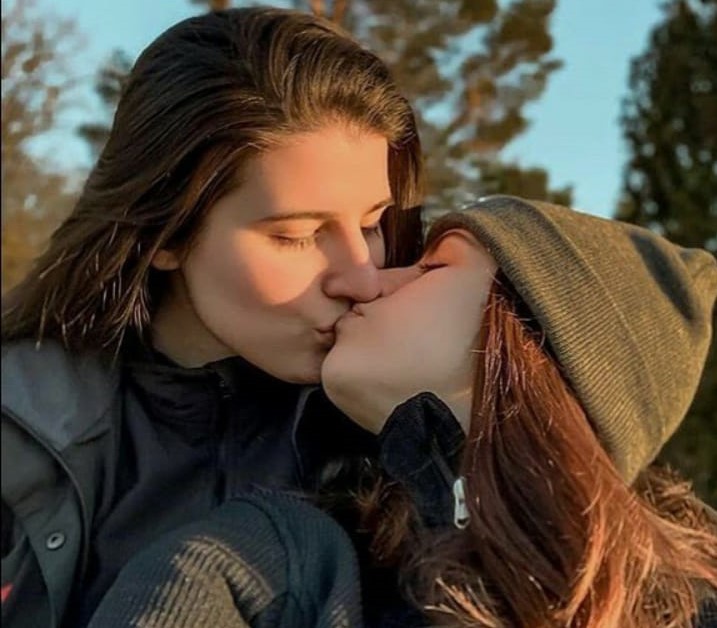
Mojo: Most Inspirational
LGBTQ Celebrities
What Does It Really Mean to Be Queer?
What is a Gayborhood?
Lilly Singh and Friends
Celebrate Pride Month
Kinsey Institute: Who Are These LGBTQ Americans?
LGBTQ: Acronyms and Words
Words Words
Video:
We Get It, You’re Gay
Love Bravely: Mini LGBTQ Documentary
Celebrating LGBTQ
Trailblazers
The Queer Agenda: Essays
by Shohreh Davoodi
LGBTQ Alphabet
Pew Research Center: LGBTQ Social and Demographic Trends
Info: Famous LGBTQ People
The survey finds that lesbians are more likely than gay
men to be in a committed relationship (66% versus 40%).
Likewise, bisexual women are much more likely than
bisexual men to be in one of these relationships (68%
versus 40%). In addition women, whether lesbian or
bisexual, are significantly more likely than men to
either already have children or to say they want to have
children one day.
As LGBTQ adults become more accepted by society, the
survey finds different points of view about how fully
they should seek to become integrated into the broader
culture. About half of survey respondents (49%) say the
best way to achieve equality is to become a part of
mainstream culture and institutions such as marriage,
but an equal share say LGBTQ adults should be able to
achieve equality while still maintaining their own
distinct culture and way of life.
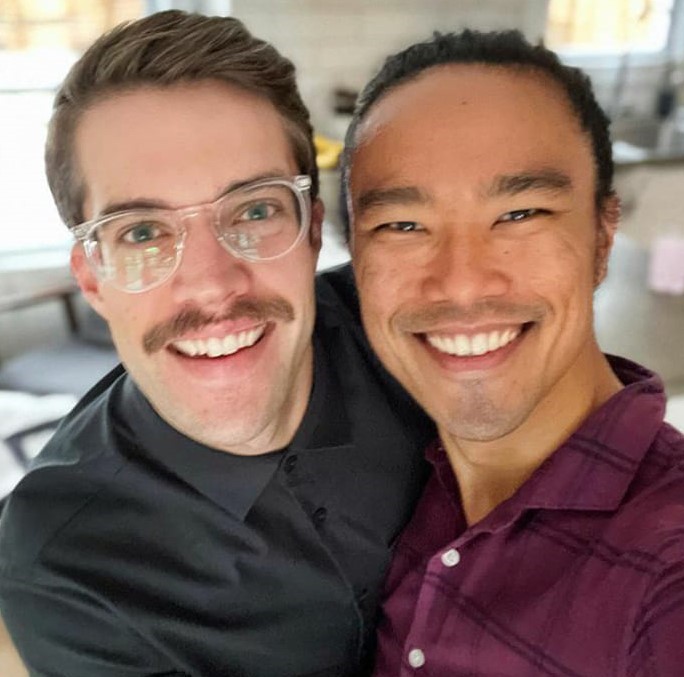 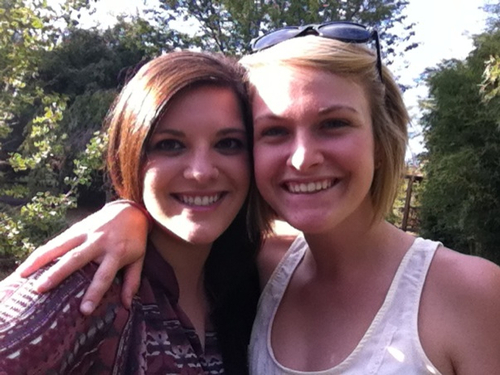
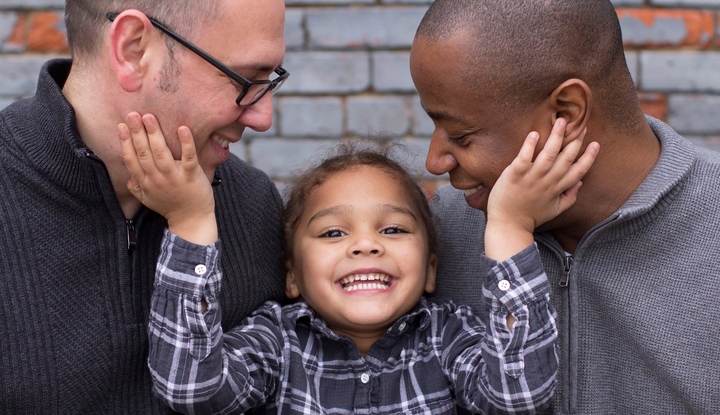
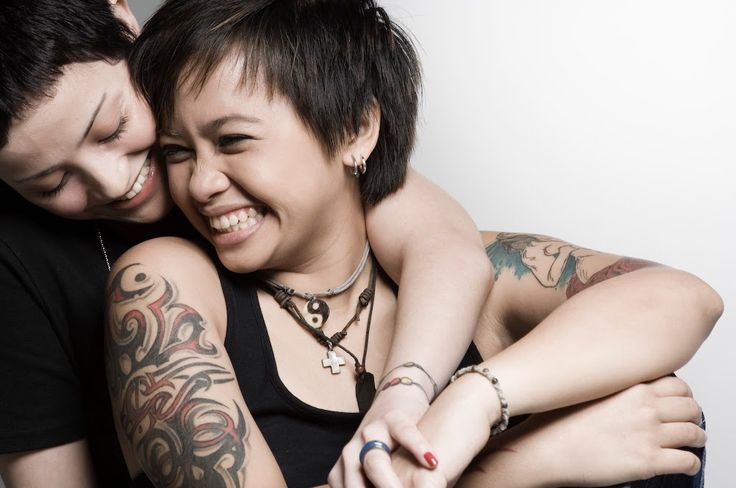
Overall, many LGBTQ adults say they have used their
economic power in support or opposition to certain
products or companies. About half (51%) say they have
not bought a product or service because the company that
provides it is not supportive of LGBTQ rights. A similar
share (49%) says they have specifically bought a product
or service because the company is supportive of LGBTQ
rights.
Some 52% have attended an LGBTQ pride event, and 40%
have attended a rally or march in support of LGBTQ
rights. About four-in-ten (39%) say they belong to an
LGBTQ organization and roughly three-in-ten (31%) have
donated money to politicians who support their rights.
Indya Moore: Daily Affirmations
Advocate: Queer People Have Always Existed
Ellen: Best of LGBTQ Pride
LGBTQ Voices: Learning
From Lived Experiences
Video List: Famous LGBTQ Folk
Bowie's Story
Advocate: How to Be More
Out and Proud in Your Everyday Life
Wikipedia: LGBTQ Culture
LGBTQ Pioneers Everyone Should Know
Info: LGBTQ Celebrity Couples
Mojo: Most Inspirational
LGBTQ Celebrities
Video: How You See Me
List: Famous LGBTQ People
Sophia's Story
DotGay Dictionary: Who Are Your LGBTQ
Role Models?
Queer Daze
Wikipedia: LGBTQ Community
Lilly Singh and Friends
Celebrate Pride Month
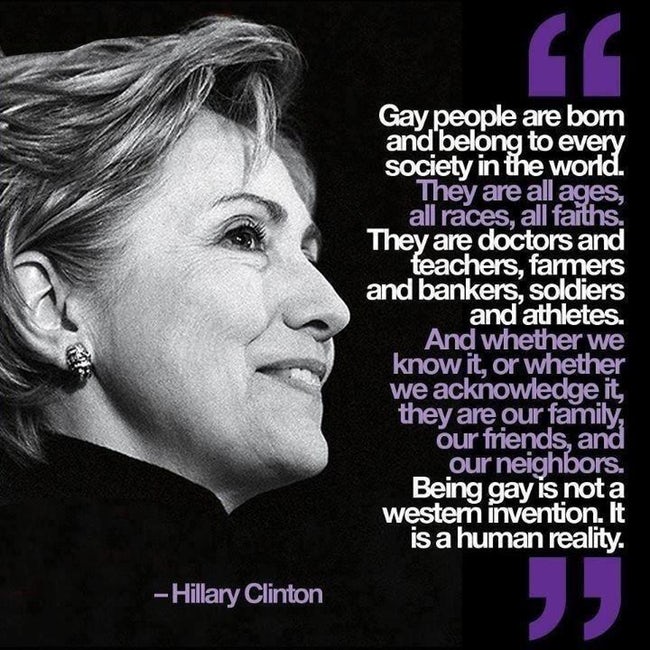
LGBTQ Lifestyle
In current usage, the
term “lifestyle” refers to the ensemble of choices that
an individual may make in employment, leisure
activities, dress, and self-presentation that serve to
link him or her with a larger group in society (hippies,
yuppies, goths, geeks, jocks, hipsters, leather). The
element of choice is central. Although an individual may
have been raised in one lifestyle, he or she may elect
to join another.
This usage contrasts with
the meaning of the term when first introduced in the
early part of the 20th century, denoting an
individual's basic character or “way of life,” as formed
in childhood, after which it cannot be changed.
There are problems
associated with the definition of the word “lifestyle.”
Lifestyle is currently a journalistic rather than a
social science term. For this reason its definition and
boundaries are not always easy to determine. In theory
everyone has a lifestyle, but in practice the word
attaches to those who have departed from mainstream
conventionality.
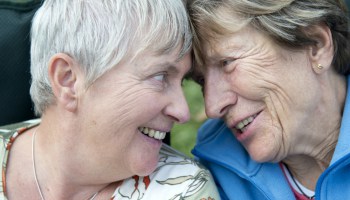
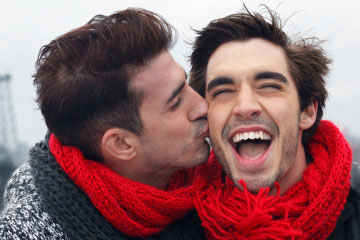
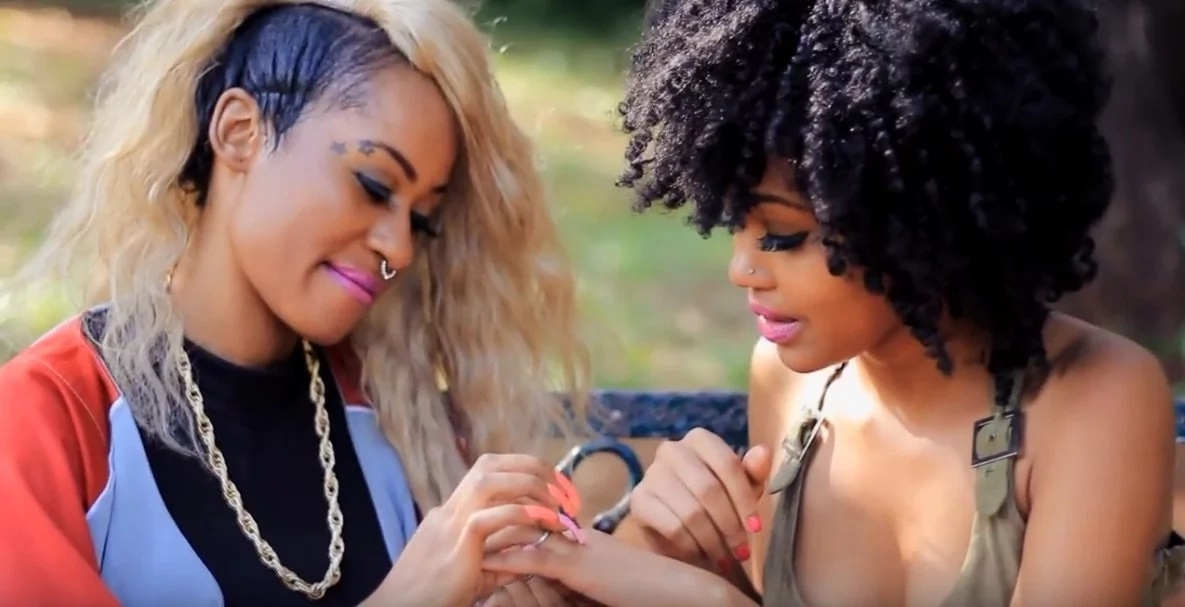
Wikipedia:
LGBTQ
The Queer Agenda: Essays
by Shohreh Davoodi
Advocate: Lessons From
Stonewall
PBS: LGBTQ America by the Numbers
Anderson Cooper: Being Gay is One of the Greatest
Blessings of My Life
Video: LGBTQ Facts to Celebrate
Info: LGBTQ Biographies
Shear's Story
Smoking Hot Gen Z Celebs Who Prove The Future Is Queer
Kinsey Institute: Who Are These LGBTQ Americans?
Queer Quizzes
Invisible
Histories Project
Celebrities You Didn’t Know are Gay, Bisexual or Lesbian
Adding to the difficulty
is the recognition that lifestyles may overlap. A
motorcyclist may participate both in the leather gay
subculture and the biker subculture. A gay musician may
be simultaneously involved in a variety of subcultures
that can be separately defined by types of leisure,
entertainment, fashion, art, and religious expression.
Finally, on closer inspection what appears to be one
lifestyle, may break up into a bundle of related
phenomena. Although the gay lifestyle may be discussed
in a unitary fashion, one should bear in mind that it
has many subcomponents, so that the lifestyle of a
lesbian businesswoman is very different from that of a
lesbian S&M adept. Neglect of these very real
differences has sometimes hobbled the effectiveness of
gay and lesbian activist organizations, which tend to
assume a greater social homogeneity than actually
exists.
The affirmation of a
lifestyle is oftentimes a reflection of social class and
socioeconomic status. Sometimes it is based on the type
of leisure activities a specified group engages in.
Adopting a lifestyle proclaims one's value system and
one's personal self-definition to the world at large.
Hence the term "alternative lifestyle," which connotes
that its bearer dissents from the conventional wisdom of
society's mainstream. In this sense a lifestyle may be a
new form of heresy, one expressed in conduct rather than
formal belief system.
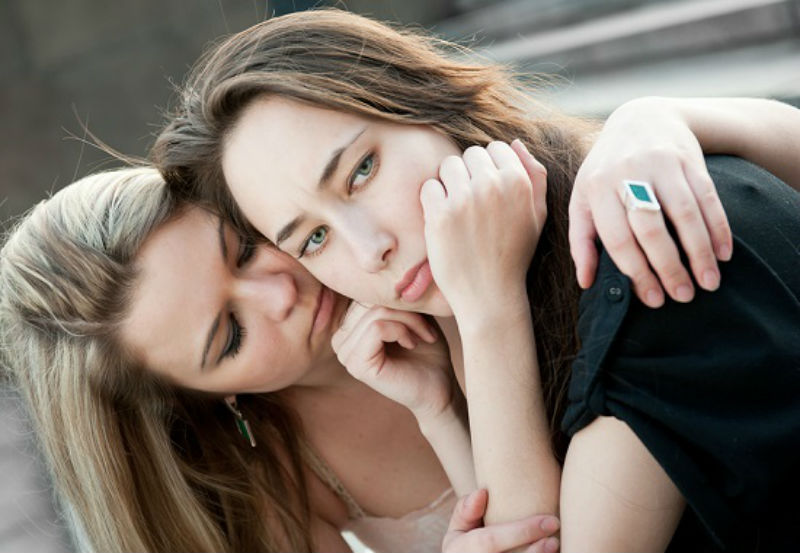
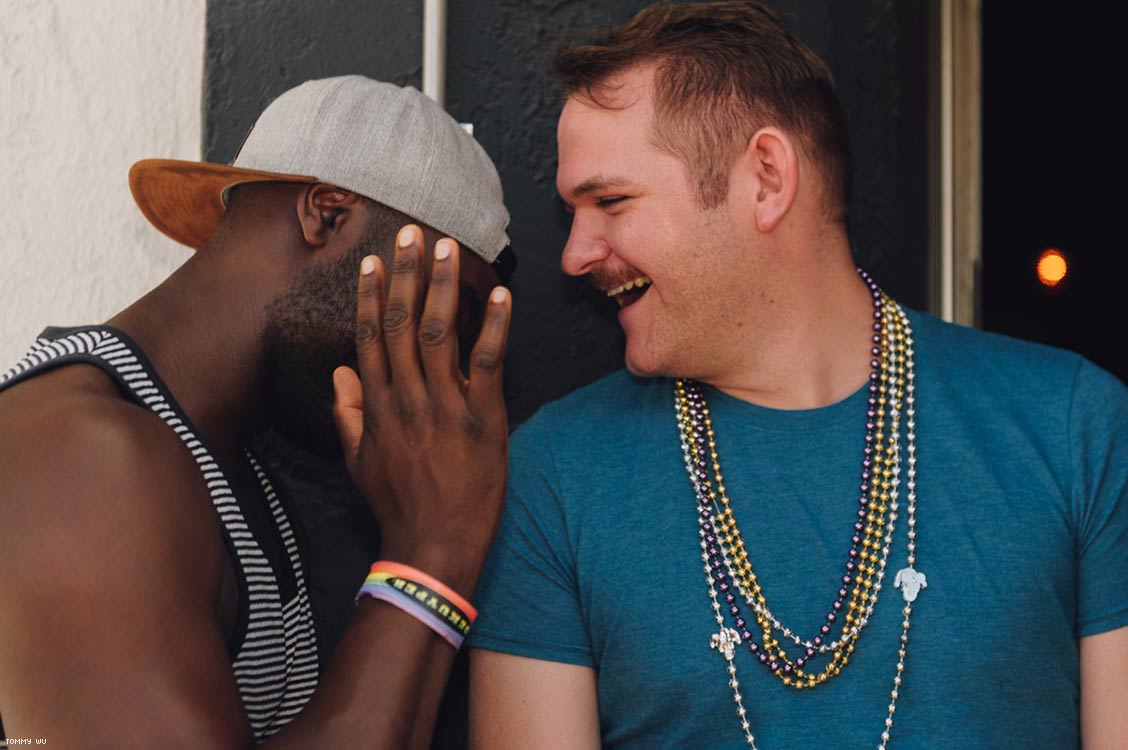
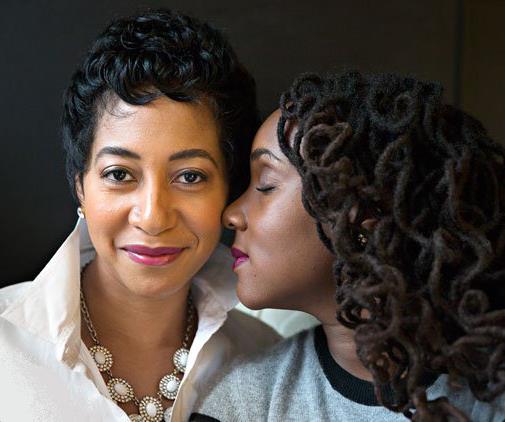
LGBTQ Activists You Should Know
Ellen: Best of LGBTQ Pride
Video List: Famous LGBTQ Folk
Rebekah's Story
HuffPost: LGBTQ Elders Share Their Thoughts About
Today's Queer Youth
Faces: Can You See Past the Label?
Video: How Gay is
America?
What Does It Really Mean to Be Queer?
What is a Gayborhood?
Queer
Majority: Essays, Articles, Issues
Celebrating LGBTQ
Trailblazers
100 Gay Things To Do Before You Die
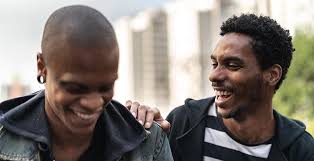
Pew Research Center: LGBTQ Social and Demographic Trends
Mojo: Most
Inspirational LGBTQ Celebrities
LGBTQ: Acronyms and Words
Words Words
Info: Famous LGBTQ People
Video: Introduction to the LGBTQ Community
The Legacy Project
Advocate: How to Be More
Out and Proud in Your Everyday Life
LGBTQ Alphabet
Lilly Singh and Friends
Celebrate Pride Month
Wikipedia: LGBTQ Culture
Our Trans Daughter: Jamie and Rebekah
Census Estimate: One Million LGBTQ Households in America
Pride
Primer
Politico: LGBTQ Community Stories
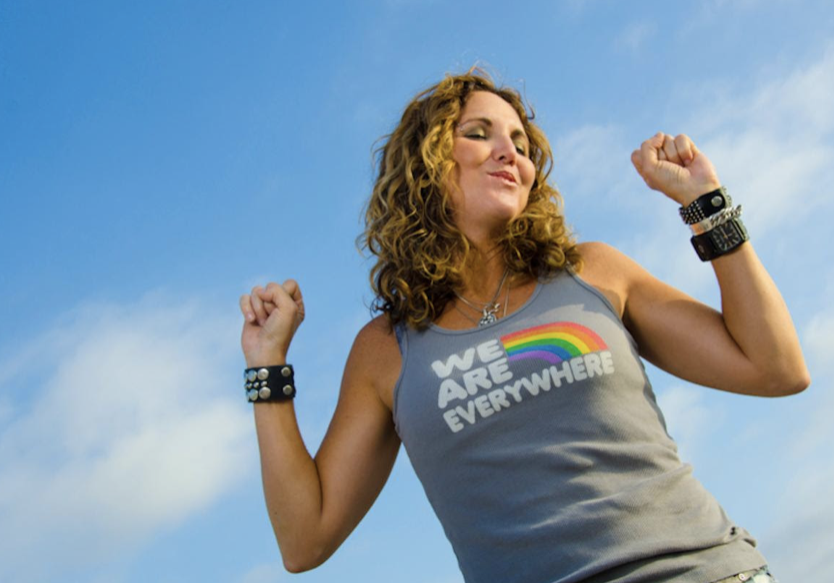
A lifestyle includes
modes of behavior, speech, dress, thought, and social
attitudes that define a segment of the population and
serve as a model for those who seek acceptance by the
peer group. At the same time it may have an individual
aspect that serves to distinguish the subject from
others of his or her social class and ethnic group. This
phenomenon is seen, for example, in some types of
teenage rebellion.
What is the “gay
lifestyle?” Attainment of increased leisure and of
greater discretionary income undoubtedly furthered the
emergence of the contemporary gay lifestyle. The earlier
part of this century witnessed a clandestine homosexual
subculture in the big cities of the Western world, but
it was the gay liberation movement of the late 1960s
that created a self-conscious public with its own media
and its own social identity. The rejection of
heterosexuality with all that it implied (including
participation in activities traditionally defined as
appropriate for male-female couples) was matched by the
growth of a new set of values and standards shared by
the emerging gay world of metropolitan America. A
characteristic style of dress, patronage of particular
bars, bathhouses, and resorts, subscription to the gay
mass media, and participation in community events of a
more or less political content were the criteria of a
gay lifestyle. At the same time a lifestyle could also
be symbolic behavior aimed at attracting sexual partners
of one's preference.
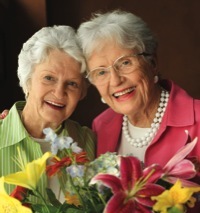
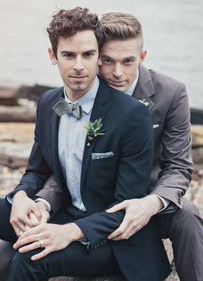
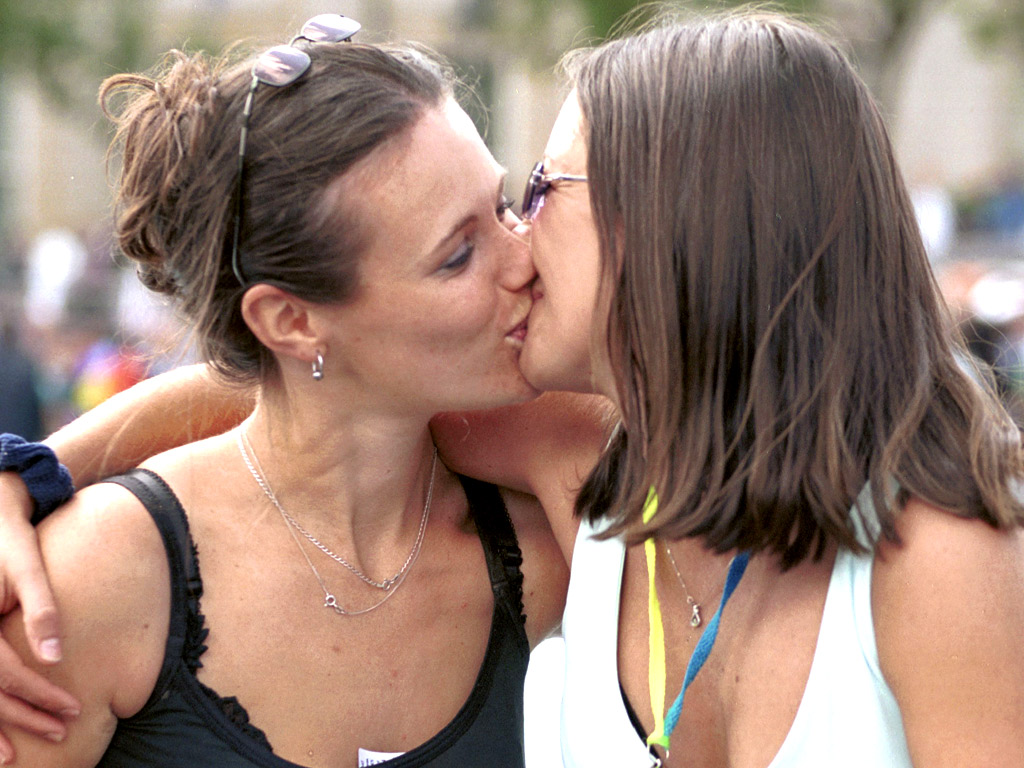
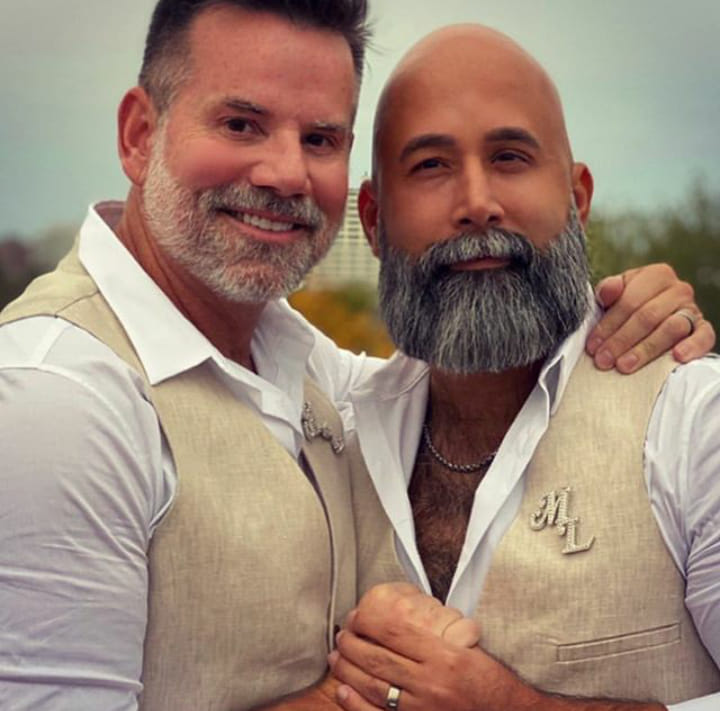
Indya Moore: Daily Affirmations
List: Famous LGBTQ People
How Harvey Milk Changed the Gay Rights Movement
HRC: 2020 Pride Benefit
Concert
Queer View
Mirror
Brandi Carlile Receives HRC Visibility
Award
Wikipedia: LGBTQ Community
What is Morally Wrong With Homosexuality?
Demographics: How Gay is America?
LGBTQ Voices: Learning
From Lived Experiences
Celebrities You Didn’t Know are Gay, Bisexual or Lesbian
LGBTQ People are Marvels
The hallmarks of the gay
lifestyle of the 1970s were: living as a single adult,
or in a casual union with a partner of the same sex that
could be terminated at will; freedom from the
obligations of conventional heterosexual marriage;
fashions of dress and coiffure that marked the subject
as part of the gay subculture; a level of discretionary
income considerably above the norm for a heterosexual
couple; acceptance of sexual experimentation and
promiscuity if not as the norm, at least as behavior to
be accepted in others without criticism; and periodic
attendance at demonstrations, rallies, meetings, and
similar events that brought together diverse strata of
the gay community on specific occasions such as the
annual Gay Pride Day marches in major cities.
The gay subculture
perpetuated the tradition that had originated in the
bohemias of the 19th century, as well as the
"alternative lifestyles" that came into vogue with the
radical wave of the Vietnam War era.
Only with the threat of
AIDS in the 1980s did a monogamous homosexual lifestyle
gain in popularity and achieve for a certain part of the
gay community the status of a norm. Also, as
conservative values displaced the liberal or even
radical ones of the late 1960s, the forces shaping
Western social attitudes began to affect the behavior of
the denizens of the gay subculture. But the
consciousness of being part of a minority (one whose
conduct differs significantly from that of the
heterosexual majority), whose sexual activity is still
strongly tabooed in the eyes of many, and whose values
deviate markedly from the traditional norm, continues to
shape the lifestyle of the homosexual.
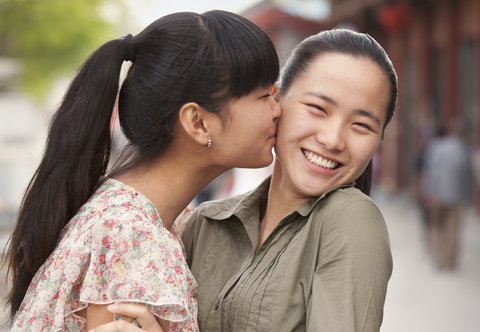
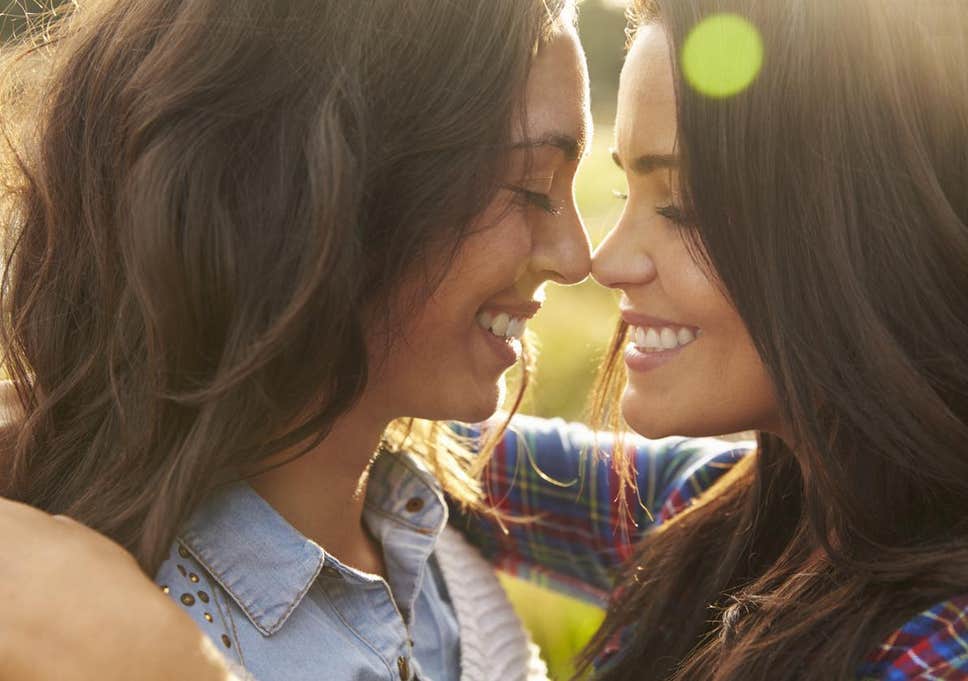
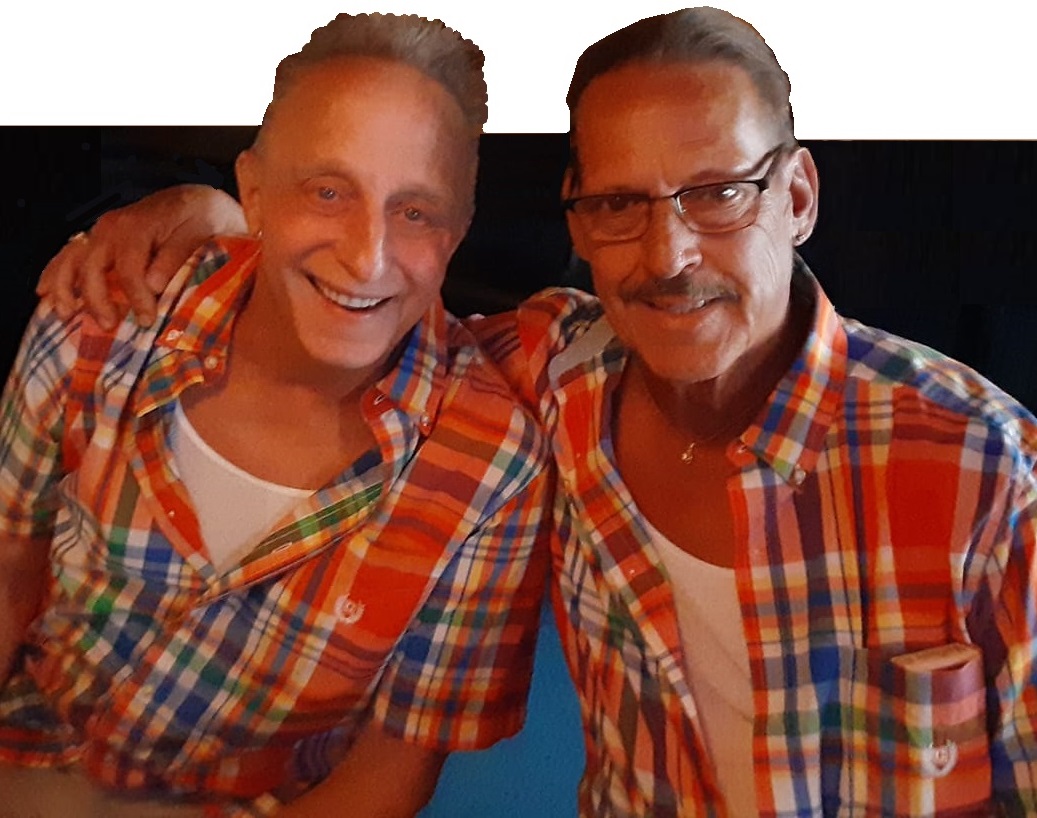
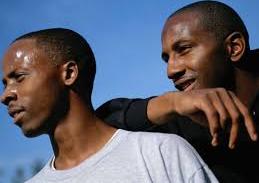
To be sure, the
homosexual lifestyle is not monolithic, and shows
contrasts between coupled and single individuals,
between urban and rural individuals, and between leather
adepts and those who prefer "vanilla sex." As the
foregoing discussion has indicated, the relative
importance of these "sub-lifestyles" in the mix has
shifted over time, and further changes may be expected.
The choice of a lifestyle
is one of the freedoms that modern society accords to
its members. Premodern societies often prescribed the
behavior of an individual on the basis of social class,
family position, and age so rigorously as nearly to
obliterate the personality of the subject. The
atomization of society, the emancipation of the adult
from the tutelage of the extended family, and the
constant drive of the global economic system to find
markets for new objects of consumption. All these have
contributed to the emergence of variegated lifestyles as
behavioral options for the citizen of the contemporary
world. The gay lifestyle owes its viability in turn to
the freeing of sexual morality from the narrow limits of
previous centuries, and to the emergence from
clandestinity of an "alternative culture" that could
openly disdain many of the norms of the still intolerant
larger society.
[Source: Warren
Johansson, Encyclopedia of Homosexuality]
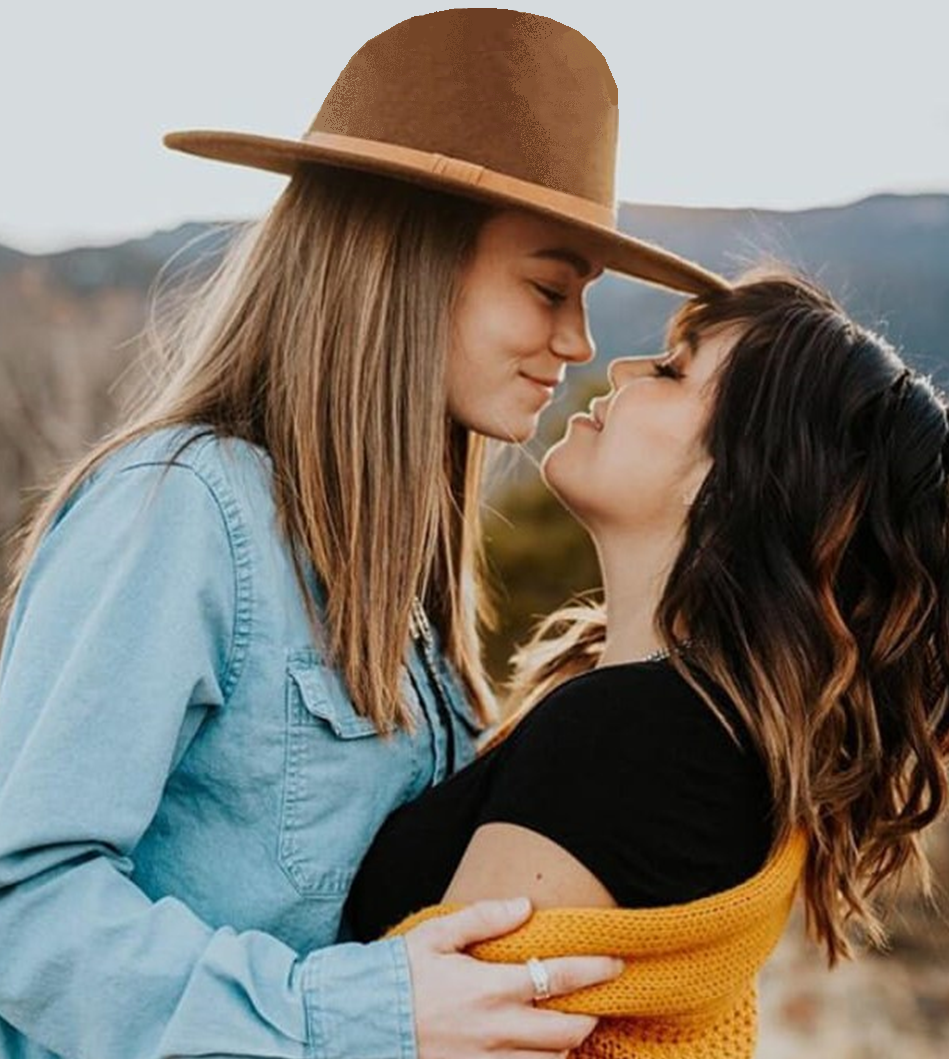
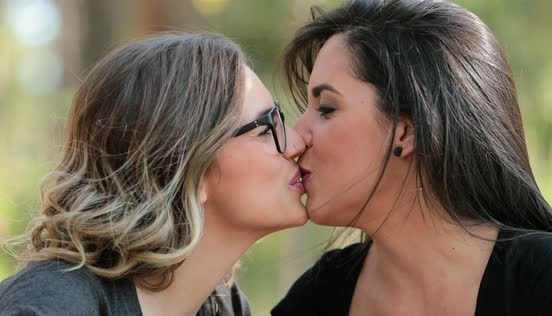
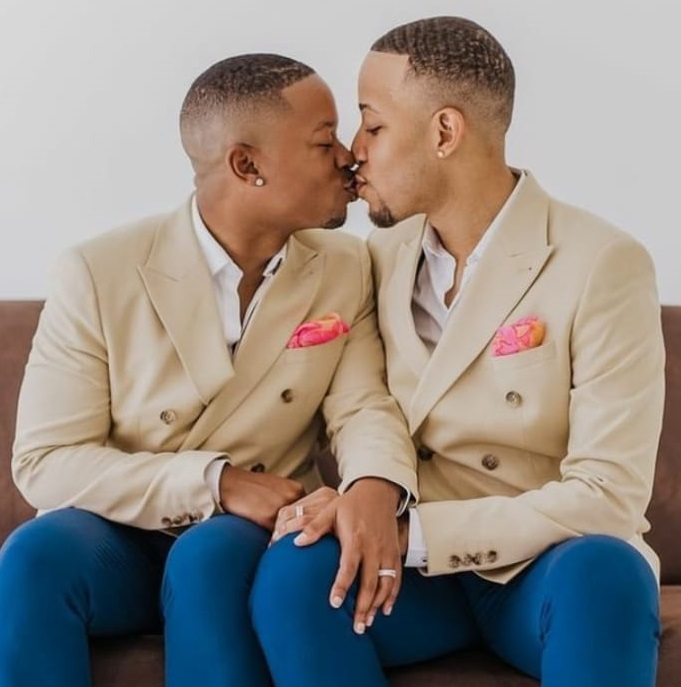

Famous LGBTQ People
History of the LGBTQ Movement
LGBTQ Celebrity Couples
Famous LGBTQ People in Science and Technology
LGBTQ
Heroes and Champions
LGBTQ Arts, Culture, and
Entertainment
Famous LGBTQ People in Sports and Athletics
LGBTQ Leisure and Recreation
Famous LGBTQ Politicians
LGBTQ Biographies
LGBTQ Marketplace
Research and Data on the LGBTQ
Community
LGBTQ Movie Stars
LGBTQ Television Stars

HOME
QUEER CAFE
│ LGBTQ Information Network │ Established 2017 |